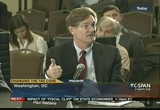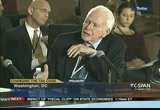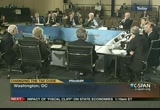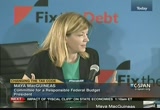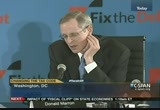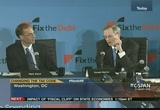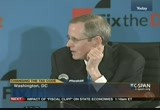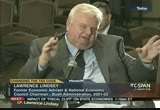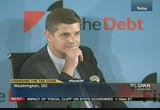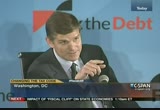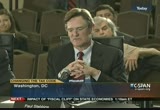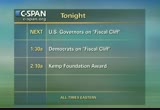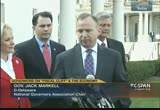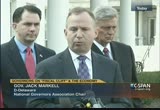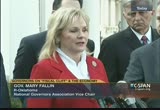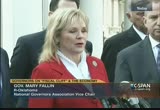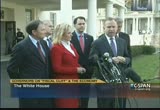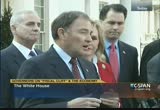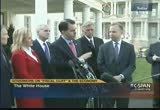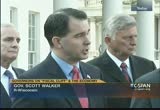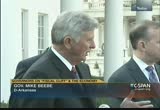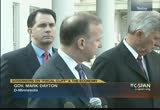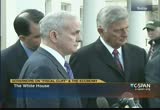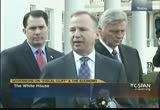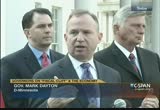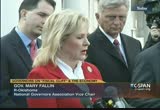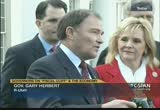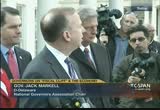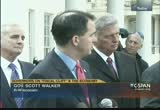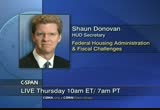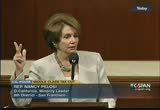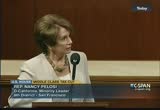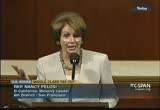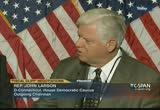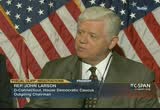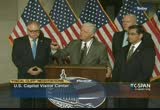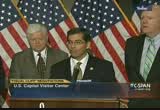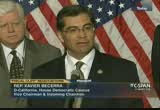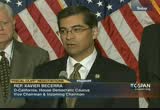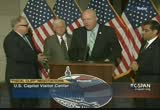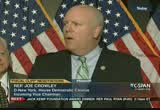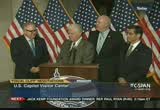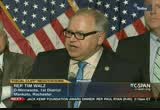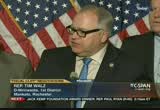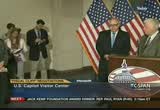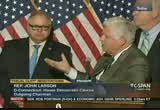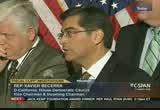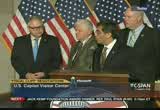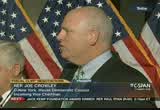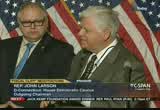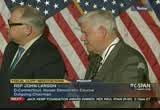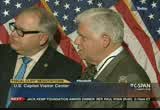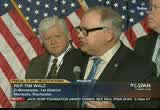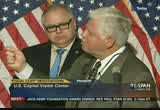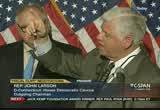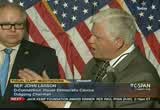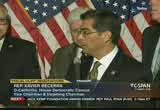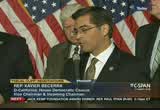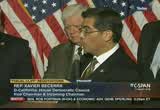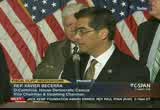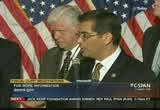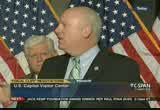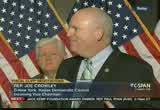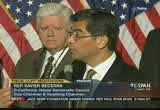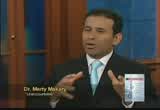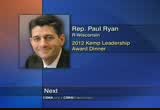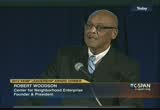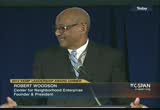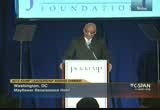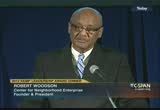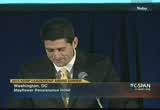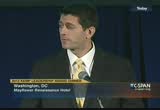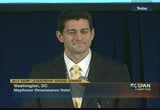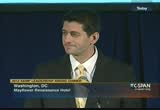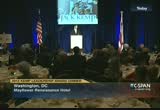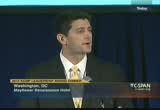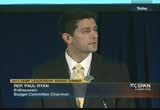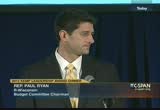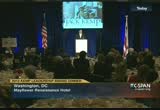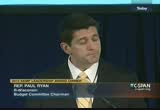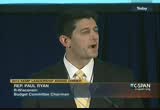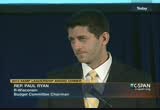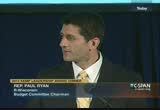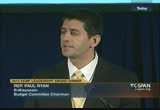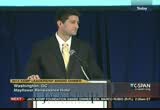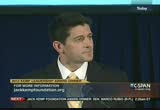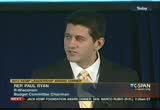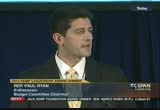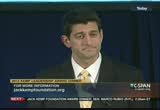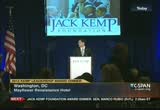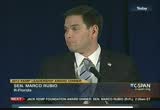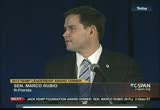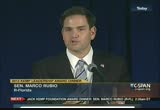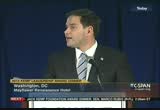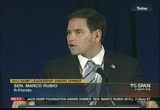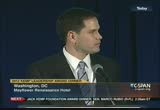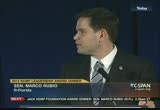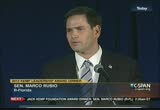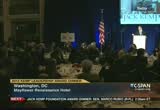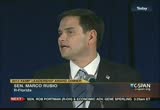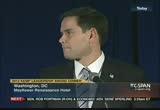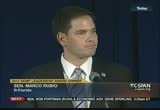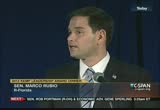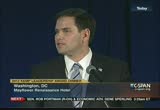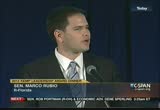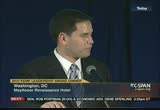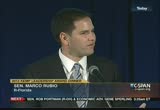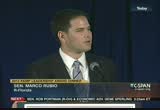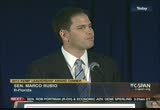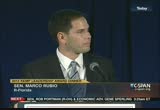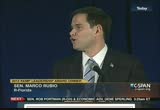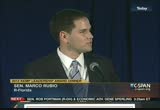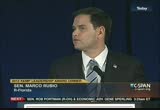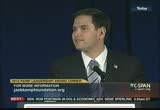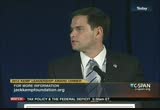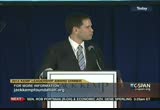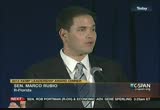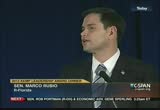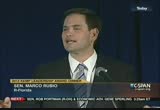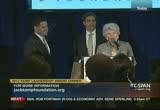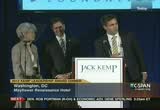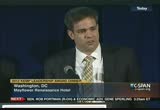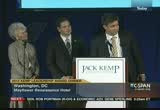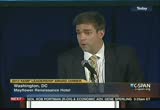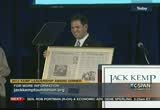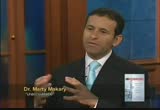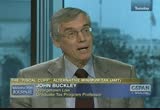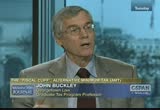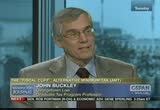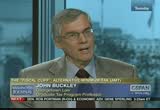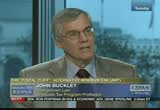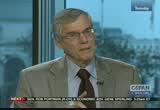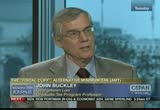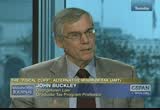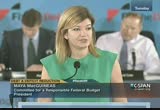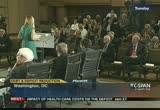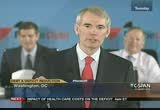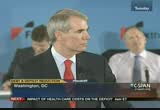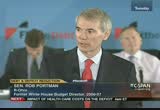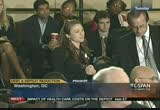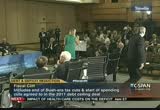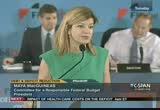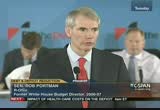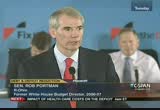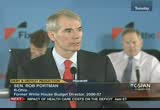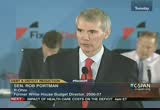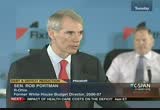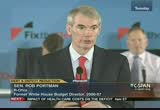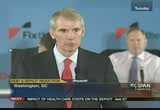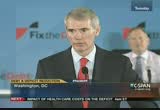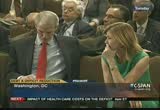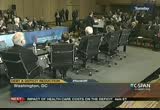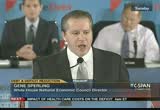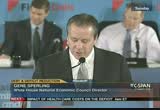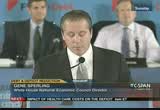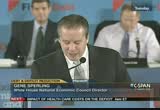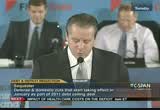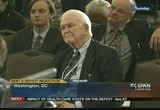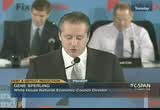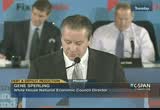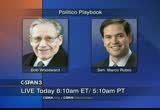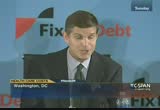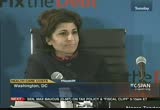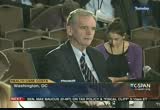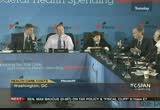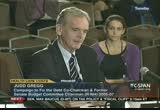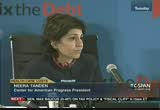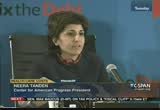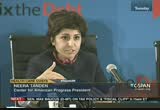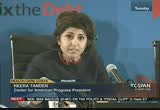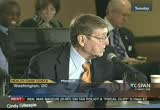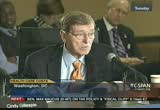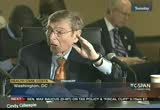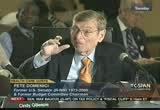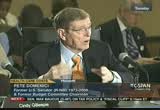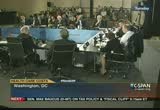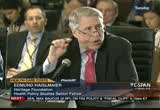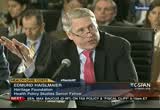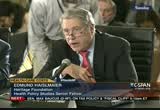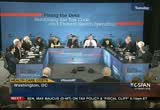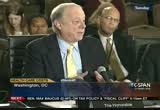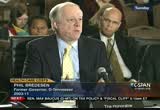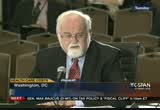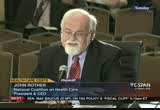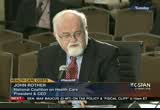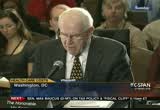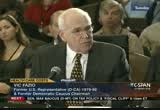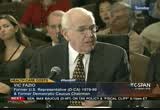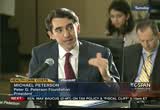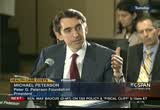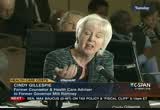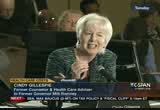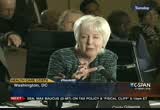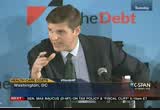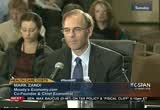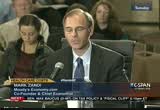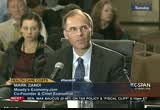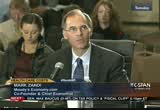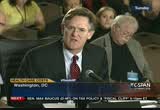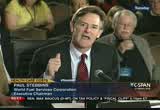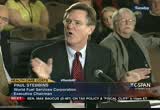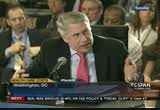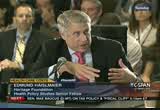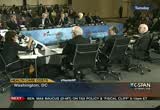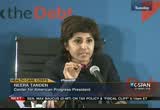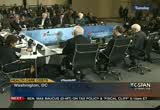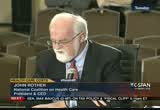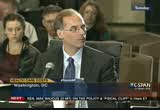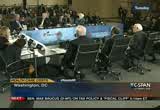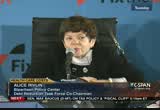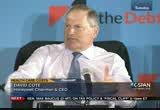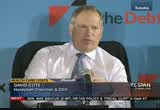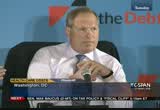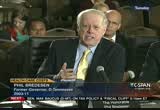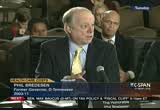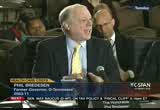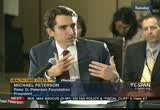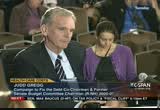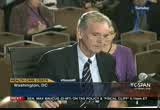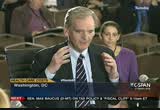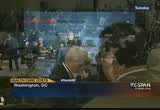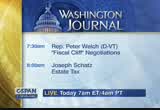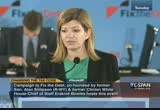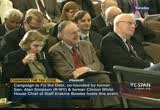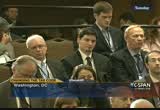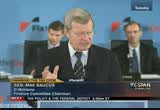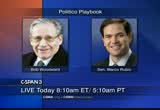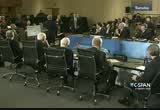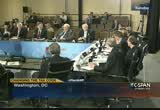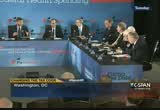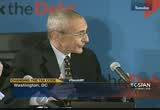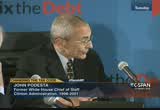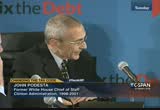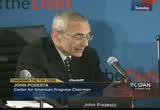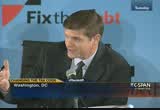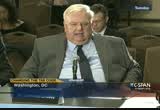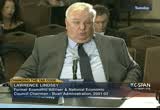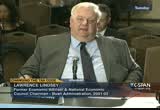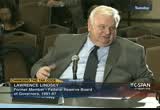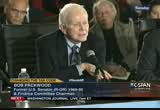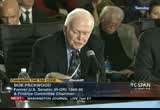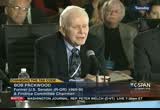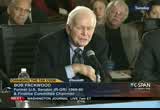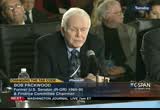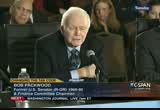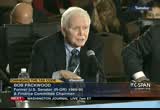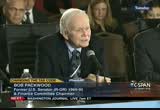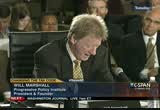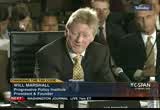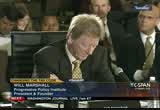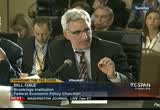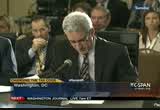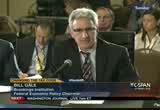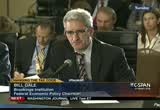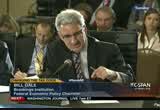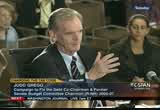tv Capitol Hill Hearings CSPAN December 5, 2012 1:00am-5:59am EST
1:00 am
1:01 am
>> here are the figures, when you look at it. oecd started after world war ii. you could at least tell what the revenue was. we did know what the gdp was. no. and we are now, all governments, spending 42% of the gdp. and we want to make any effort to stop that? or are we discussing to say it has never stopped before? >> i think the earlier social security, not fully implemented. there was no medicare. it has been pretty stable since 1980. it goes up and down with the
1:02 am
business cycle, but it is pretty stable. this is the division between the right and left. who will continue to fight about bigger government and smaller government. we will not do it by refusing to pay for the government we have, thinking the economy in the process. that would be a good start, as a backdrop. i want to touch on your question about corporate and individual taxes. the third piece is small businesses. we work out how develop a tax code that is good for competitiveness. you need to think about how those play into it. i think one of the things to keep hearing through messages with different groups of people is, while everybody is aware that the solution is going to take sacrifices from all sides, on spending, on revenues -- the confidence you get for putting the deal in place to actually has tremendous economic benefits. the cheapest form of stimulus is
1:03 am
confidence. if we can put that in place, and people believe something is going to stick, it becomes easier to do your part in all of this. if the moving pieces and revenue are there, do not underestimate the benefit of what the future holds. >> this ties into michael's point. the productivity, the amount of money they get spent maintaining and administering the complex tax code is unbelievable. i would rather be spending that money. let us get on with building a business. society should do it. people should take that as a given. i know the rest of us have it. we would gladly get rid of all of that in a minute. it is a health care issue. we talked about technology and data sharing. there are productivity, issues that are significant. >> i want to touch on some other hot-button topics we have not discussed as much.
1:04 am
capital gains, dividends. current laws, they go back up. dividends treated as ordinary income. capital gains goes back up to 20%. how much revenue are we talking about? if those become bargaining chips, how much are we giving up? >> under current law, the capital gains rate is scheduled to go to 20%. we are actually talking 23.8%. dividends are scheduled to go to ordinary rates. you need the 3.8% for people who have higher incomes. significant increases in both are scheduled. as you think about the fiscal cliff and what is coming, one of the few places you can see people responding to it is in their behavior around capital gains and dividends. companies are moving up to how, shareholders take a vintage of a lower rate. i expect you will see more
1:05 am
investors realize lower capital gains in order to get lower rates. there is clearly money there. there is clearly money that has interesting, distributional characteristics. as you think about the political process trying to structure when a package with a revenue goal and a distribution goal, my prediction is you will see at least some of those increases occur. i personally would be surprised if the dividend rate went back up to ordinary rates. the senate would allow it to stay at the capital gains rate, and go it to 15% to 20%. the president initially proposed cutting dividends they the same as capital gains. my guess would be that that is where we end up. >> what would you say is best? should the dividend be the same as capital gains tax >> i find it hard. i have looked around.
1:06 am
i find it hard to have an argument for why the dividend rate of to be higher than the capital gains rate. i am sympathetic to the argument that some corporate leaders have, engage in empire building and look for excuses to keep pete pashtun. there are benefits to having some of it paid out in regular dividends. i am sympathetic. there is a laugher curve effect, which is -- a laffer curve e ffect which is at some point -- if you start talking about raising capital gains rates to ordinary income rates, the model we use suggests you may actually go too far and start losing revenue, because capital gains are, in some sense, a discretionary, a voluntary thing to realize. i do not think there should practically be a discussion about going that high. it is hard to go to war over the
1:07 am
difference between 18.8 and 23.8. anybody want to go to war over that? >> what is your own thought, if it returns to ordinary rates? what happens? >> when it was first cut, which was in 2003, we were running into a problem, because the stock market was down perianth america's pension funds were in trouble. we did a back of the tombolo calculation which turned out to be too cautious. the dividend was worth 8%. 1100 dow points, something like that. i think that is probably right. i forgot a name.
1:08 am
>> it is out there. it is about twice that. i do think that recent capital gains rates will not have found effect will not anticipated. there is money there. >> we have not talked about the estate tax. a lot of politics in the u.s. senate over the estate tax. could this deal blow up over the estate tax? >> maryland has been known to do very aggressive things on the floor of the senate. have think of end up with a split -- with an estate tax of one to run number barry wants it to be at. >> really? we have about a minute or so left. anyone else want to weigh in? you have a unique opportunity. the president, john boehner, could be getting set to talk again later this week. what advice would you give them on taxes? >> these are very minor issues, in terms of total revenue
1:09 am
derived. but they are very significant to members. if you were to tell the bulk of the democratic caucus in the house that we were going to do something draconian to the inheritance tax, that could cost you a lot of votes. this is a carefully crafted a balanced package the house to emerge. all these issues need to be tested. a little focus group on the conference side. these can be symbolically important. they can blow the opportunity to do something broadbased and fundamental. do we end up with something close to balsams and because of that point? >> we would be better off if speaker boehner and the president did not publicly change their offers. hopefully, they are going to have to compromise. the more times you commit yourself in public, the harder it is to make the compromise. >> we will go around the former
1:10 am
members of congress. do they cut a deal to avoid the fiscal cliff before we actually get there? >> i believe so. >> senator? >> yes. the treasury secretary says withholding taxes and does not have to raise them even if the taxes go up. why sequester does not have to be month by month. you can do the sequester in the last 12 months. he gives the congress four or five months into the next year before the house to reach a deal. >> they could kick the can down the road. who thinks the market will not let them do that? there will be punished. sooner rather than later, you think? we have not seen it so far. >> i am in the camp of, the herd will turn. erskine bowles was a famous line. we got away with this last time because we were the best-looking horse in the glue factory. we are not going to get a pass this time. there is no question.
1:11 am
who will get punished. and that is very dangerous for everyone, all of us. >> it is great for me to remind you -- you can watch the president on bloomberg television shortly. he is going to be on at 12:30. thank you for a lively discussion. interesting points made. maybe some food for thought. >> the one thing that struck me was how much -- this is probably by design. how much of our discussion was not on the fiscal cliff, but actually the fact that what is really important here is avoiding the fiscal cliff, but using it as an opportunity to help address these huge fiscal issues. >> the group hamas "campaign to fix the debt," was co-founded by alan simpson and art singles, former coach fares on the fiscal commission for responsibility and reform. >> coming up next, governor's
1:12 am
visit the white house, for meetings on the so-called fiscal cliff. and then remarks from congressman paul ryan and senator marco rubio from the kemp foundation awards dinner. >> this week on the c-span networks, hurricane sandy response and housing issues. wednesday, the fema administrator joins the housing secretary before the senate appropriations committee, to testify about hurricane recovery efforts. live coverage at 10:00 a.m. eastern on c-span 3. on tuesday, he secretary testifies on the federal housing administration and fiscal issues. see that live, starting at 10:00 a.m. eastern, here on c-span.
1:13 am
[delaware runyan -- [bell ringing] >> follow harry truman's eldest grandson to hiroshima to mark the dropping of the atomic bomb in 1945. >> everybody has their own view of what happened. i do not want to argue civil rights with anybody in japan about the history. i think we are past that. my whole purpose for being here is to honor the dead, to listen to the living, and to see that this does not happen again. >> in washington, he discusses the inspiration for his trip and
1:14 am
his meetings with bomb survivors. >> several governors met with president obama tuesday to discuss the soda ash called fiscal cliff and its impact on states and the economy. -- the so-called fiscal clef. members of the national governors' association spoke to reporters but the white house for about 15 minutes. >> good morning, everybody. i am the chair of the national governors' association, the governor of the telephone, -- of delaware, joined by the governor of oklahoma, the vice chair. and we are also joined by the governors of wisconsin and arkansas. we are three democrats and three
1:15 am
republicans. we just had what i would say it was a very good meeting with the president. the issues we face as governors and states are considered as part of the discussions going on in washington. the president was very open. we talked about some of the issues we focus on as governors, one of those same opportunities for flexibility, in terms of some of the programs we partner with the federal government. he was open to that as well. and there is an impact not just from the fiscal issues, but the issues in terms of how the discussions here will impact the economy's back home as well. the president to pick up on that and said he would be interested in our ideas, with respect not just for the fiscal issues, but the pro-growth issues. we have a number of follow-ups.
1:16 am
the vice president will be the point person for us, going forward. who very much an invitation to stay involved. as three democrats and three republicans, we agreed we were going to focus on what we have in common, which is a lot. i think we all recognize there is an impact on our states. we want to make sure that we, as the national governors' association, and as individual democrats and republicans, are working together. i want to turn it over to governor fallon, and then we will take questions. >> i am from oklahoma. we are grateful for the opportunity to visit with the president on behalf of the national governors' association.
1:17 am
we know there are still many states experiencing budget shortfall. some states have experienced growth in their economies and are recovering. we know we are still dealing with states that have lower unemployment rates, and some of higher unemployment rates. we want to be part of the solution to the problems facing our nation, to be able to offer some of the innovative ways we have been able to address some of the concerns they have faced around state budgets. we understand that the discussions being held about federal cuts, whether it is taxes or tax reform, whether it is spending here on capitol hill who or sequestration -- that will have a huge impact on individual state budgets. as governors, we are preparing our state budgets, which most of
1:18 am
us will introduce in january and february, as we begin our legislative session. we have decisions we have to make. , we are open-heart as the president and u.s. congress, the house and the senate, finalized,, and are able to come to conclusion -- a conclusion at the end of the month, that we will give our opinions on effects on public policy. we asked how we can save money and create more efficiencies, government, and spending, with different demonstrations we have done. we plan on getting back to the president and vice president with some of our suggestions and ideas. we appreciate your time today. >> why don't we take questions? we are not saying it should be this plan or that plan. we all agree something has got to get done. the idea that taxes on so many
1:19 am
middle-class americans could go up at the beginning of the year, if something is not done, could negatively impact the economy is in all of our states. with that, we are happy to take some questions. >> middle-class tax rates -- will the cuts be extended? and do you encourage or support the president have plan -- president's plan? >> we are not backing one plan or another. , i will ask my colleagues to comment. none of us want to see taxes on middle-class folks go up. we think it would have a significantly negative impact on our economy. we are not backing one plan or the other. >> i think what we heard and what we are giving the message to date is -- will give it not only to the white house, but to
1:20 am
congress. you have got to come together to get this done. this impacts the economy. the uncertainty is creating havoc with our states. in my budget, if they do not get it resolved, not only do we not have money if we are anticipating in utah, which is having a healthy economy -- we could take a $5 million loss in revenue streams because of not the thing is resolved. we are going to encourage people to come together and get it done. which also are saying that states are willing to do our part. we understand this will be a shared sacrifice. you have to look at spending cuts. states are willing to do more with less. we are asking for more flexibility. it has been a common theme with the president, with congress. take away some of the strings, and we can help you balance your budget and keep the economy afloat. >> what did you say to the president about taxes?
1:21 am
>> as jack and mary mentioned, we are here not just as individual governors. we are here on behalf of all 50 governors. our focus was not to indorse a specific plan or to dismiss a specific plan, but to point out that, as governors, it is important we have a seat at the table. the things i talked about are similar to what the others talked about. concerns about the economy. concerns about the finances. we are going to follow, as an organization aha -- we are going to follow up as an organization. we can highlight our finances. this will be similar to our discussion with the congressional leadership. we are not elected to fix the problems of washington. the members of congress are
1:22 am
elected to do that. we are here as a resource for people in our states. >> was he receptive? >> in our case, who talked about this the other day as an association. we thought it was imperative to focus on things that unite us. that is what we focus on. >> the implementation of the president's health care law, and how that could affect medicare cuts? >> no specific discussion. >> there was no specific discussion of how the new health plan will affect medicare or will affect the economy. there is no specific discussion on that. there was not any lengthy discussion on the establishment of the exchanges. the focus was on what has just been reported. that is, the states are willing to share the sacrifice. we do not want to take it all, but we are willing to do our
1:23 am
part. we do not need shifting. we do not need cuts on the federal level that merely require tax increases on the state level. there was a unity by all of these governments -- all of these governors. the goal was not to get specific on any area, but to offer our willingness to assist. there was not a detailed, specific discussion about federal health care and the impact it will have. >> we did talk briefly about the potential of unintended consequences, particularly as it relates to medicaid. probably not all, but some of us have made the decision to expand medicaid. in our case, we made the decision because of the underlying economics. there is better reimbursement for the population we are already serving. if that were changed, we would
1:24 am
have to revisit that decision. [indiscernible] >> i am sorry? the president certainly understood what we had to say about that issue. it is a conversation we will continue to have. >> the president said he looks forward to streamlining the federal oversight, and some of the problems with congress, some of the workforce programs. there are so many committees and subcommittees involved. he said as long as our goals are aligned with the objectives of the program and his administration, they are open to discussion of how we can do things in a more streamlined way.
1:25 am
>> [indiscernible] >> a third of our budget in minnesota comes from the federal government. if we can live with the program and it is more money, absolutely. >> do you leave here, more or less confident as you leave here? >> i know the president certainly wants a deal. he did not try to handicap it for us, but he made it very clear he is gone to work as hard as he possibly cairn, along with his team. he looks forward to working with members of congress. he wants to get something done, but he did not handicap it one way or the other. >> did congress gets specific in making his case to the american people? >> i think it was the position
1:26 am
he understood. because we represent democrats and republicans alike, that would not be the thing for us to do. we came not to embrace one plan or the other. we can to make it clear why it is so important that something happened on the economic and the fiscal issue, and to make sure the white house, the administration, and members of congress realize we are willing partners. we have some ideas we could share. he was very open to those ideas. this is certainly the beginning of the dialogue. it is not the end. >> is there a stalemate in this process? >> what people are concerned about is the uncertainty that the current state of the debate represents a, to businesses and individuals across the country.
1:27 am
we all know businesses are more likely to invest when they have a greater sense of what is to come. the all look forward to business investment, more hiring, and the like. we believe the sooner this gets resolved in a way that is not a three months, but the fix for a longer time, the better off it will be. >> did any of the republican governor is hot state to the president the opposition to the health care, changes you have been facing in the states? >> the subject did not come up. we understand there is a shared responsibility to try to reduce the debt, which we all support. we understand the uncertainty but affect our state budget. we have talked about how we can grow our economy, create jobs, work toward creating more efficiencies. one of the things we did ask is that, as the federal government
1:28 am
considers the cuts they are going to make, that they consider the cuts upon the states. when there are cuts upon the states, but still mandated things we have to do, that has an effect on our budget. we asked for flexibility in how federal money is passed down to the states, the we would have the flexibility to be able to do what is in our states, with relation to our different problems and how we would be able to make decisions based upon what is best for our states. >> we do talk about medicaid. we talk about the budget in the debt reduction that needs to take place, and doing it in a way that does not topple the economy. you can help pay the bills by a healthy, growing economy. and we have suggestions on more
1:29 am
flexibility, when it comes to medicaid. my state made a number of requests for waivers. we received some, and some we have been denied. and we are going to try to get together this next year and, as an association, provide suggestions of where we can streamline and get rid of some of the red tape, and maybe have flexibility to do more with less, and how as felons our budget. he pledged he would take a look at those things this next year. i am encouraged by that. >> is there a sense of how serious the sides are? each has accused the other of being unserious. >> we have an opportunity this the afternoon to meet with the speaker in the leader separately. i will let the others speak. my sense is that this president is very focused on coming up with an answer. he cannot do it on his own. he seems to me to be very
1:30 am
serious about finding something that makes sense. >> given your standing within the party as a national leader in the conservative movement, did you have to tiptoe through the minefield of representing the interests of your party versus the interests of your state? >> it goes back to what jack was just saying. this would be a good lesson for everybody in washington. what you see here, but we had in this meeting -- there is a mentality of what one side said. you have a collection of governors, representing all 50 governors in this country, who did not get off into pet projects, he said we hope there is going to be something that happens here. in the end, we hope it is positive for our states, both for our finances and for our economies. we talked about what
1:31 am
collectively unites us instead of divides us. >> thank you all very much. [captioning performed by national captioning institute] [captions copyright national cable satellite corp. 2012] >> more meetings on the fiscal cliff and the economy, with senate majority leader harry reid and house speaker john boehner. >> on washington journal, the latest developments in the fiscal quick negotiations. after that, political looks at the estate tax, which is set to go up at the end of the year unless congress and the white house fact. live wednesday at 7:00 a.m. eastern, on c-span. >> wednesday, politico hosts a discussion with bob woodward, author of "the price of politics," and marco rubio.
1:32 am
mike allen moderates the discussion. see that live at 10:00 a.m. eastern on c-span 3. house democrats filed a discharge petition to force a house vote to extend the bush era tax cuts for middle-class families. the bill has already passed in the senate. next, we hear from nancy pelosi. the course of the election the president made it very clear that he was courting the extension of the middle class tax cut and that everyone, 100% of the american people, would benefit from it. 100% of taxpayers, small businesses, wage earners, and the rest. the republicans are saying that rather than passing that they want to hold it hostage to giving an additional tax cut to
1:33 am
people making over $250,000 a year. that's not negotiating. that's hostage taking. so today on the floor of the house the democrats have proposed a discharge petition which if it receives 218 signatures, that's only a couple dozen republicans joining the democrats, would automatically come to the floor and i predict would receive the overwhelming support of the house of representatives. the miles per hour people want us to work together. we are in -- the american people want us to work together. we are in agreement on this subject. why? why my republicans -- republican colleagues, can we not agree on something where we have agreement, where we have fairness, that would work to create jobs, to reduce the deficit, and again have fairness. this is the heart of the 3459er -- matter that is holding us
1:34 am
here. as the public watches what is this about? this is about the $250,000 line that the president said in the campaign that he would honor and that that legislation today brings to bear. i urge my colleagues out of 435 members of the house, we only need a couple dozen republicans to sign the discharge petition. each one of them holds the key to a $2,000 tax cut for the middle class. either sign the petition, urge the speaker to bring the bill to the floor, or explain to your constituents why you do not want them to have this $2,000 tax break if they are -- for 100% of the american people. please sign the discharge petition. let's get this done this week. we could bring this bill up
1:35 am
under unanimous consent. the message would be clear to the american people. we heard you in the campaign. be fair. do something that works. work togetha >> today, the house democratic caucus chairman charge republicans to protect the middle class from a tax increase. they spoke to reporters following a weekly caucus meeting. the incoming caucus meeting said democrats would support extending the payroll tax cut, as long as it does not undermine social security. this is 30 minutes. >> everybody ready?
1:36 am
>> good afternoon and thank you for joining us. i am proud to be joined by my colleagues, the vice chair of the caucus, of the air, soon to be the chair of the caucus and operating. our new vice chair joins us today, as well. i am fond of calling sergeant major tim, who is spearheading our effort on a discharge petition. we just came from and important caucus. we still remain optimistic that we can get something done in this congress. we remain optimistic because we believe is in the best interest of the american people. we have heard all kinds of data and statistics about where the
1:37 am
american people are in terms of a sense of fairness and a sense of balance and i think the president has got it right and continues to preach the kind of message i think the nation needs. one of compromise and assuredly we will be looking out for the interests of the middle-class and the protection of social security, medicare, and medicaid for the people who are in such desperate need of those great programs that are the hallmark of our country. we have repeatedly said that job creation equals deficit reduction. we must put the country back to work. we have proposals that are on the floor. we still believe that even with the little time that remains,
1:38 am
and what little time remains when we are actually working, this is still possible. this is still doable. this is not a democrat or republican issue. compromise can be made to make sure we are putting people back to work, that chris christy and barack obama can get together on that. i know this is known firsthand of what is transpired and how the impact of our infrastructure has taken place on the eastern seaboard, it is something we ought to be able to rally around immediately. everyone deserves a $250,000 tax break. we all agree on that. why not just simply adopt it.
1:39 am
then come back and we will have time to address the issues as they relate to bending on health care. and focusing on the vast inefficiencies, the fraud, abuse. $750 billion annually. the chairman, from my district, said, it would be a way for us both to bring down the deficit, but also make health care affordable, a sensible, and functional for the american people. something i believe we must do. with that, let me introduce javier. >> thank you. it has been a pleasure serving. december. how many families do you know that are sitting down to do some quick math on finances and figure out how they can stay with in their budget and still have a little left over to buy gifts for kids and loved ones so it can be a great holiday for all american families.
1:40 am
failure is not an option for them come the holidays. on christmas day for a lot of families, you want kids to wake up and be ready to enjoy the day. if american families, as tight as budgets have been, can figure out a way to reserve a little bit to make sure it is a great holiday, we in congress should be able to follow suit. the american people are way ahead of politicians when it comes to the stuff. failure is not an option. we should get the work done the people expect. we will not agree on everything. i believe whether you are democrat or republican, you would say amen to that.
1:41 am
before we get to those holidays, before we get to the deadlines, let's do what we agree on. as our chairman just said, i think both democrats and republicans alike will agree we are willing to make sure for the middle class, we let them keep going forward, helping us revised this economy. why not do what the senate did several months ago in passing a bill, a bipartisan one. we only need a few republicans to get that done. a discharge petition was signed that we are ready to pass the middle class protection act to make sure middle-class families do not watch their taxes go up simply because republicans are protected millionaires and billionaires and holding hostage. we believe we could end december on a good note, and at least let's agree we will not let the american people what
1:42 am
congress play this game of chicken right before the holidays, where the american people are the hostages, when we know we have bipartisan agreement on protecting the middle class. we are thrilled the lead has been taken on this. we are anxious to get this going. our disagreements should not stop us from moving forward where we both agree we can get things done in a bipartisan manner. let me welcome the incoming vice chairman of the caucus. [applause]
1:43 am
>> i appreciate the rousing applause. let me thank these two for including me today in the press conference and welcoming me into the house and caucus. i am pleased to be here at this important moment in time in our nation's history. i agree with both. what you do today is important for we as a caucus in terms of where we are at, but i think it shows the american people's message they send. they reelected the president. he ran on an agenda of giving a tax break to 98% of american people. that opportunity is before us. it is the opportunity to do that before the holiday season is over.
1:44 am
the expression "time is fleeting." have a few working days left to act upon what the american people want to do. we have fewer days now that the republican leadership has reduced the working days this week. we can still get this done. it will take an effort. i know we have the opportunity to set things straight today. i will turn it back to the chair. >> thank you. without further ado, let me introduce the individual who is spearheading this effort from the great state of minnesota. tim is known in our caucus as the sergeant major.
1:45 am
>> thank you. a 50-50 district went for president obama appeared a long history of being centrist on issues but very pragmatic. the farming district includes health care systems. spearheading some of the reforms there. what came loud and clear through was, let's try to focus on the politics we agree on, move those things, and then come back later to the things we disagree on. the issue of a discharge petition to move forward, this is something we agree on. there is not a single
1:46 am
republican who signs this who is violating any pledge they took on taxes. this will ensure we think the middle class tax. it provides a certainty you heard the talk about during a very important time to spend money for this. i think it sends a strong signal. maybe there is another component to this. there are other members who have to go back home and say, what did you do to make this different? all we are asking for is folks will vote for this. i think many in the house will eventually vote for this anyway. the president said he will sign it. by the end of the week, if this is brought forward, we congratulate one another for agreeing on this, send the signal to the american public we can break this and that changes the whole conversation going forward. i am honored to be able to lead
1:47 am
this fall or. i think it comes out of the midwest pragmatism that says we will all have to compromise for the good. do not hold up. keep in mind, that is 100% of the american public that gets a tax credit on this. this is not excluding anyone. it does the bulk of that, 90% of all taxpayers and businesses have all that certainty. i encourage you to sign it. i know there are republicans who will take a hard look at this, and hopefully to the right thing. do the right thing. >> [indiscernible] is that something you think democrats could support as may be a bigger deal? do you think it is there it is on the table? >> the president has been very clear. so has our caucus, that while we think everything should be on
1:48 am
the table for discussion, we do have very deep, abiding concerns about where cuts would be made specifically and how fair and balanced it is. our criteria is that it has got to be fair and balanced. if it is fair and balanced, it should be part of a discussion. as for pulling our caucus and where it would be, i would say that is something that would be a big leap for our caucus. the devil is always in the details.
1:49 am
where is the balance? where is the fairness? where is the fairness in the wealthiest nine tenths of 1% doing their fair share if the exact that out of people who are in need of medicare and medicaid? it is a fairness argument and always has been and that is what it will continue to be. there is a great job done of putting forward the proposals of the president and the specificity that the president had outlined, which, if you put it on a graph, would be like this. then the republican proposal is like this. it is a difficult time for the republicans. we want to provide them with every opportunity to save face and come up with something they can do reasonably. tim's proposal that everybody
1:50 am
agrees with that there be a $250,000 tax cut, that this be preserved for everybody. 100% of the people will receive that. not 98%. 100%. so why not go forward with that when we can all agree on it? here is the president's proposal. it is in small print because it is so detailed and specific. there are the republican proposals. >> i can read that. >> [laughter] that is our concern. >> i will mention one quick point. i think democrats have always been willing to put everything on the table. we reduced the cost of medicare by over $700 billion. we found savings of $700 billion in medicare. no one should question whether
1:51 am
democrats are willing to try to extract savings to reduce the cost of medicare. a lot of democrats lost their elections because republicans campaigned accusing democrats of cutting medicare. even in this presidential campaign, the president was attacked by mitt romney for it. what mitt romney forgot to mention is none of those cuts in spending in medicare cut benefits. when we did the reductions in medicare spending, we made sure none of those could come at the expense of american seniors who are receiving medicare. the reason you can do that is because there are enough savings to be had. you go after some of the fraud and waste and you get a ton of savings. that is what we did. in a district, there are a lot of efficiencies to learn from. we are willing to discuss
1:52 am
reduce spending on important programs. what we are not willing to discuss is, in the first instance, how you pay for deficits that were caused by things other than these programs. we did not pay for these two wars in iraq and afghanistan. we did not pay for the bush tax cuts that went heavily for the very wealthy. why seniors should take cuts to their services and benefits they paid for in medicare or social security so we can draw down deficit and debt that was caused, that is where it has to be explained to us. we would be willing to listen. we are willing to make reductions in spending in very important programs. >> you have been following how this has been going. you proper motions to give a middle-class tax cut to the middle class. blur the lines by bringing in new issues to protect the wealthiest 2% in this country, to divert the discussion from
1:53 am
them to other means of savings. i would suggest we have also offered savings within the medicare system. we are willing to discuss that. what we want them to do is stop talking about the protection of the wealthiest 2% and talk about giving a tax cut to the middle class in this country. >> just a final point on that. i think it has to be said. i said it in my opening remarks. i think he has got it right. if you look at the cost of health care, and as we are headed towards the opening of the exchange in 2014, we know the cost associated with our deficit and getting that under control all relate to bending
1:54 am
that curve. when the rest of the world is at 8% of gross domestic product that they spent on health care, and, in many instances, offer universal health care, we are at 17%, and even with obamacare, are not quite there, is it not fair for us to look at bending that curve and bringing those costs down? what we know is if we work together, taking a republican concept, romney care, and having exchanges and work to bring to bear on this -- all of our innovation, all of our technology, all of the great capability and genius of the american people, we know we can reduce these costs. the fairness argument -- is it fair to always lead with reducing it on the backs of the beneficiaries, as opposed to what the root problem is of the cost and the expense?
1:55 am
>> there has been a lot of talk about using tax deductions and loopholes to raise revenue, getting rid of those. stepping into the debate, how do democrats feel about the mortgage interest tax deduction, and whether or not that should be tampered with, and whether you can get revenues by reducing mortgage interest rates? >> when you look at everything in a comprehensive manner, and the total aspects of tax reform in general, everything should be included on the table. having said that, this is the backbone of -- one of the backbones of the middle class. clearly, we support and feel very strongly about sustaining the middle-class, who use the mortgage deduction and mortgage build up to, for the most part, pay for college education as well.
1:56 am
>> dealing with the mortgage interest deduction would hurt the middle class. >> if you take it in isolation. it depends how you balance it off. the rubric for us is, in has to be balanced. it has to be fair. it has to be comprehensive. it should be on the table to be discussed. we do not think that randomly you can pick things out, without understanding the unintended consequences that would provide. >> on the mortgage interest deduction -- i have a bill setting out there, trying to garner some republican support, that takes away the mortgage interest deduction for yachts that count as second homes. mr. larsen is talking about a schoolteacher trying to make sure it is affordable to buy a home, while there is a mortgage interest deduction available to people who buy yachts. that is coming from the person
1:57 am
who represents the land of 10,000 lakes. i do not see a yacht in minnesota. that is the type of reform we are talking about. instead of signing on for that, they come to the middle class. that is where the frustration and fairness lies. >> we have heard from you all this morning, and also from steny hoyer, that there needs to be some give, that you are willing to give. but where does the give come in? you talk about balance and fairness. i remember a caucus meeting on the debt ceiling. a change cpi. everybody did not go for that. the sound similar. you double down on your positions. where is the givebacks >> first of all, he start with the budget act itself, with more than a trillion dollars that has been reduced in a fairly difficult economic recession. we start there.
1:58 am
then we say, we put a very significant down payment in, during the midst of the recession. when democrats, in general, who believe that what we ought to be doing is making enormous investments in infrastructure improvement, so we can put the country back to work. we have put the down payment on the cuts. we have not seen anything by way of job creation, which directly impacts deficit reduction, and we have said we have been willing to discuss how we further -- you heard the term and talk about 750 billion that was taken out of medicare already, but the aarp and everybody else recognizes was inefficiencies that can be taken off of the table. we know that in looking at -- whether you take medical devices, whether you took
1:59 am
pharma, insurance, hospitals, doctors -- we ought to be able to bend that curve. that is on the table. what bothers us is that when it comes down to a fairness argument, that they start always with our beneficiaries, the people. we are not called the party of the people. we are called up for a specific reason. that is where we start. that is who we care about. that is where we are going to continue to focus. we have put skin in the game, and continue to do so. if you look at the expense of proposal the president has put forward, you understand he is serious about this. he puts this forward at a time when economists are saying we have to be very careful that we do not send ourselves back into a recession. i understand.
2:00 am
a ideologically, people who believe they want to shrink government up so small they can drown it in a bathtub -- they always leave that way. but it is not in the but it is not in the best interest of the american people. >> i hope at some point you all who have heard us on this side talking about this bill do the math. $3 trillion worth of cuts. $1 trillion that was exacted as a result of the budget control act.
2:01 am
the nation would default on its credit if we did not do anything. $1 trillion. there is another $1.20 trillion that came from the same law as we know it as the sequester, that also will start to take place. that is $2.20 trillion. we talked about the $760 billion democrats passed without one single public and revolt -- republican vote. that is close to $3 trillion. where is the balance on the revenue side? never did any of those two proposals in the budget control act have any revenue to them. people ask where are the cuts? what are you doing on entitlements? we have been doing it. you all are either not paying attention or do not wish to ask based on the map. finally, you ask why democrats
2:02 am
are willing to put everything on the table and are so adamant about social security. in 2013, seniors in america are finally going to get a small cost-of-living increase. the average about $21 a month. less for some seniors. a little bit more for most. on average, seniors to get about $14,000 benefits a year, will get about a $21 a month increase in benefits to pay for their medicine, the increased cost of their rent, daily living, $20 a month. republicans are saying we must cut that cost of living increase for those who pay for those benefits. they are also saying we must cut social security benefits so we can protect the wealthiest 2% of america's wealthiest from
2:03 am
entering any tax rates -- tax rate increase. in the 1990's, we were hiring 23 million new americans. social security is here for us. we know what it meant to folks during the 2008 recession when no one was willing to look at their 401k statement on a monthly basis because they had lost so much, and yet, social security, on time, in full, paid benefits in 2008. social security made more money in 2008 than it had to pay out. in the 77 years since social security has been enacted, how much have you and i paid into social security? $14 trillion. how much is left? over $1 trillion of hard cash
2:04 am
from taxpayers in 77 years is left. why would you want to cut social security when is the most successful program this country has ever invented to help americans. >> let me play devil's advocate. this is something consistent to what has been said. given these concessions, trillions of dollars and other cuts, does that mean there is not much to give? >> absolutely. we will sit down and have a balanced conversation and ago -- and negotiation on everything when the republicans decide they get off this. let's do this until then. let's not just fight. let's at least dispose of the issue where we all agree. protect the middle class from the tax rate increase.
2:05 am
we do not need to hold peaceful -- hold people hostage america. >> included his plan, the idea that spending the failed tax cuts for another year. is that something you support? >> i think it puts money into the hands of people who need the most. putting it right back into every economy. eventually, what we need to be talking about is creating an atmosphere for more jobs in america. what we need from this congress is an infrastructure. putting people back to work and contributing furthermore to the growth of our country. we need to talk about a growth agenda. for the moment, i think that is something we would support. we will continue to support, to keep money in the hands of people who need it desperately right now.
2:06 am
let's make it very clear. we continue to be sidetracked by issues that take away the focus of what we should be talking about. in 98% of the people in this country who, if we passed the measure that has been offered today, would give every american who aren't up to $250,000 a tax cut -- who earn up to two under $50,000 a tax cut. what we have here is to be held hostage that same 98% of america, clearly by the republican caucus to protect the very wealthiest in this country from paying the responsibility -- their responsibility. we are getting their, but it will take cooperation -- there, but it will take cooperation.
2:07 am
i know it takes a lot of time to sink in. there are consequences to alexians. -- elections. get on with the business of furthering. >> the acquisitions of the failed tax cut -- they are something you pay into and get out? >> we would not support it if it did that. we made certain if we were going to do the payroll tax cut, none of the social security that would go into the system would be denied. what we said was the general fund replace the money that would have gone into the social security trust. in that trip -- in the math, the unused social security funds, i did not include the trillion
2:08 am
dollars -- the did $1 trillion -- the $1.50 trillion. you actually have a surplus. real money. therefore, it is available. none of us believe we should do anything to undermine it. we should never support any tax cut proposal that would undermine social security. only if we had a guarantee that the money that is temporarily left out, only if we know it is replaced with democrat support, the payroll tax cut holiday. those would get supported and we would support it. >> up next, speeches by paul ryan and marco rubio. then, two events.
2:09 am
talking about the fiscal cliff negotiations. a panel of business voters and politicians discuss health care costs. >> this week, hurricanes and the responses and housing issues. craig fugate and shaun donovan testify about hurricanes and the recovery efforts. on thursday, a testimony before the committee on federal housing administration and physical challenges. here on c-span. >> we have had these explosions of knowledge in medicine. but we have not coordinated care. all of these services we have end up having so many cracks
2:10 am
that they are as harmful as the diseases we are treating. you have got to step back and ask, are we hurting people overall on a global level? what are we doing sometimes? now we have got these reports saying, 30% of everything we do may not be necessary in health care. when we step back, 30% of all the medications we prescribe, the tests we order, the procedures, this is something which is, for the first time, being called out as a problem. >> dysfunction in the u.s. health-care industry. what hospitals will not tell you. his latest is "unaccountable." >> every year, the jack kemp foundation recognizes people who live shown exceptional leadership in advancing the
2:11 am
american idea. next, we hear from congressman bob ryan. he is the formal vice-president -- former vice presidential nominee and the two dozen 11 recipient of the award. >> good evening. i have the distinct pleasure of introducing our keynote speaker. i am the president of the center for enterprise. and a jack kemp groupie. [laughter] jack kemp worked with me for five years to help residents in public housing. there was a conference. bill observed, when liberals see
2:12 am
poor people, they see a sea of victims. conservatives see poor people and see a sea of aliens. jack kemp and paul ryan are the exceptions. [applause] toward the end of the campaign, paul's staff called me and said, paul really wants to talk out on an anti-poverty agenda. could you organize an event in no haohio that would bring the leaders from around the state who have experience transforming not only lives but also revitalizing neighborhoods. i identified 20 people and sent him to hit -- send them to his
2:13 am
staff. they had to be vetted and secret service looked over the list of names. i got this call from paul's staff that says, three other people -- three people out of the can you send me had criminal records. i said, i am shocked. i thought all of them had criminal records. [laughter] [applause] i said, do not worry. they have been redeemed and baptized. everything will be just fine. i said, trust me on this one. one of them at the round table, they came there are with tattoos on with his wife of 30 years on his harley, he was one of our stars. he said to me, do you think it is ok if we just prayed and laid hands on paul?
2:14 am
i said, i am not sure that works with catholics. [laughter] [applause] give it a shot. [laughter] after an hour of really intense presentations by these grass- roots leaders and paul sitting there with 1000 people waiting, and he took the entire hour to listen to the testimony is coming from people and sure enough, my friend, paul, got up, came around, and he said to paul ryan, is it ok i put my hands on you and pray for you? he said, i am catholic. i am cool with that. [laughter] they prayed for him. what happened, on a more serious note, i believe character is
2:15 am
revealed not so much on a person's resonate, but sometimes by the small, spontaneous acts of grace. when we sent paul the list of 10 people he identified, four he wanted to highlight in his speech, he got on the telephone and called each one and talked with them for 10 or 15 minutes to get to know them personally. then, he gave us the full hour. afterwards, the campaign was over. he wrote a personal note to each of the 10 people within four days of the campaign, with in all of the confusion, he took the time to do that. observed the political culture in washington. some men seek power and influence in order to be somebody. real men seek power and influence in order to be a blessing.
2:16 am
order to do something for somebody. i am blessed to welcome him to address this. [applause] >> wow. man. thank you, bob. i met him when i was 23 years old in wisconsin. i was introduced to him by my mentor, jack kemp. jimmy, your family, and you for caring on the torch. quick you close your eyes, you think you are listening to -- if
2:17 am
you close your eyes, you think you are listening to jack kemp. it is something that is really a great honor to do this, to be here. back in this room like last year, and i want to say congratulations to marco rubio on receiving this well deserved honor. [applause] now, as you may know, marco is joining an elite group of past recipients for this award. [laughter] two of us so far. i will see you at the reunion dinner. [applause] [laughter] i am sure the press will not read too much into that one. [laughter] i want to thank you all for your kind hospitality.
2:18 am
i want to thank you, jimmy, for holding this event. wherever i went, people would say, i work for jack kemp. that legacy lives on some much because of the connection to the family. there was something this legacy has such reach. it is an honor to be a part of this. jack kemp was my mentor. knowing jack kemp was one of the greatest experiences of my life. i was lucky to work with him. i do not know if bill is here. he has to wake up really early in the morning to do his radio show. he and i served in the house of representatives. we had our tough hits.
2:19 am
we share something in common. we both used to be the next vice president of the united states. [applause] though i wish this election turned out a little differently, i am proud of a campaign has mitt romney and i ran. he would have been a great president. it would have been an honor to serve at his side. we gave this race our all. i am grateful for the nomination. i have to say, it is thrilling when your team trusts you with a ball. it is humbling when you advance the ball as far as you can only to come up a little short. the redskins did not find that out on sunday. the giants did. it is one of those humbling experiences that is a great lesson. losing is part of politics. it can often prepare the way for greater victories. jack kemp could be counted upon to " charge chill.
2:20 am
failure is not fatal. it is the courage to continue that counts. this work goes on. the jack kemp legacy continues on. we need to continue on fighting for the american idea, the believe everyone should have the opportunity to rise, to escape from poverty and achieve whatever your god-given talents enable you to achieve. for too many americans, it is not a promise being kept. our poverty rates are at the highest in a generation. of the millions of coat -- of
2:21 am
the millions of children born into hardship, fewer are able to escape it. some never learn to dream at all, which is a worse tragedy. when 40% of all children born into the lowest income quintile never learn -- never rise above it, what does that say about our country? to me, it says our economy is failing to provide the basic security, much less rising wages. our schools are failing to provide a path out of poverty our families and communities are breaking out of poverty.
2:22 am
2:23 am
how to work together to prepare this economy to get people back on their feet? how do we get this sense of real security and upper mobility for all americans, especially those in need? they are the same. the old ways will not do. we need new thinking and renewed efforts from all americans. it is true that president obama won reelection. i congratulate him on his victory. on january 20, he will face a stagnant economy and a fiscal
2:24 am
mess. you might say he will inherit these problems. [laughter] [applause] in his second term, i hope he will offer fresh ideas. failure will mean four more years. we have work to do. serious solutions for serious reforms, we thank him for doing that. [applause] the election did not go our way. the republican party cannot make excuses. we cannot have the next four years on the sidelines. we need to apply our timeless principles to the challenges of the day. our party excels at representing that part of the american idea that speaks to the aspirations of our nation's risk-takers. we celebrate that part involves finding a passion and making a living from it. there is another part of the american creed. when our neighbors are struggling, we look out for one
2:25 am
another. we take care of those who are suffering in the midst of our families come alive, and communities. we do that best to our families, communities, and our party must and for making them stronger. we have a compassionate vision based on ideas that work. sometimes, we do not do a good job of laying out that vision. we need to do a better job on that. the kemp foundation will help lead the way. you are keeping jack kemp's spirit alive. leaders have set their hearts and minds on opportunity for all americans. it is a brighter day that lays ahead for us. [applause] jack hated the idea that any part of america could be written off.
2:26 am
in the 1970's, when people spoke of scarcity, jack was talking about an american renaissance. not everyone listens. ronald reagan sure did. in saw jack's ideas at work the economic expansion of the 1980's and 1990's. nothing could be more foreign to jack's way of thinking than to accept poverty as a permanent way of life. he did not believe we all belong to some class or station in life. he went into a lot of troubled neighborhoods. never once did he look around and despair. others might think it is never going to get better than that. not jack kemp. he did not buy into that
2:27 am
attitude, and neither do we or most americans. america is exceptional for this very reason. both parties tend to divide americans into our voters and their voters. let's be really clear. republicans must steer far clear of that trap. [applause] we need to speak to the aspirations and a zaydis of every american -- and anxieties of every american. so no one is left out from the promise of america. it will require a bold departure from the approach government has taken over the last five decades.
2:28 am
with a few exceptions. government's approach has been to expand bureaucracy and spend a lot of money on bloated, anti- poverty programs. the mindset at work here is that a nation should measure compassion by how much it spends. by the sheer size of its government. the problem is, starting in the 1960's, this approach has created a debilitating culture of dependency. it tore communities apart. this was so obvious to everyone that when we reform welfare in the 1990's, a law was passed by
2:29 am
a republican congress and signed by a democratic president. what happened? welfare enrollment dropped dramatically. millions of people gained new lives of independence. poverty rates for children fell over 20% in four years. more single moms found jobs. your welfare checks going out and more money for states to spend on child care so more moms could go to work and support themselves. welfare reform worked because it encouraged the best in people. it appealed to their desire to shape their own destiny. it helped get government out of the business of fostering dependency. here is the problem. we have not applied a welfare reform mindset with equal vigor across programs. in most cases, we are still trying to measure compassion by how much spend cannot how many we help. last year, spending on programs came over $1 trillion. what does that mean in practical terms? for that amount of money, you could give every single poor american a check for $22,000. instead, we just spent all of
2:30 am
that money trying to fight poverty from government programs. now, what do we have to show for it? 46 million people today are living in poverty. during the last four years, the number of people on food stamps has gone up by 15 million. medicaid is reaching a breaking point. one out of every four students fails to get a diploma. half of our kids do not graduate. when lyndon johnson launched the war on poverty, he predicted it would eliminate poverty and 35 to 50 years. here we are 48 years later and poverty is winning. we deserve better. we need a vision for bringing
2:31 am
opportunity into every life. one that promotes strong families, secure livelihood's, and an equal chance for every american to fulfill their highest aspirations for themselves and families. this seeks to build upon those reforms that have worked. it calls on government to encourage and not displace the efforts of free people to help one another. it calls for a stronger safety net, one that protect the most vulnerable and promotes self reliance. it calls for the end of the chronic inequalities in our education system. it promotes economic growth from free enterprise because nothing has done more to lift
2:32 am
people everywhere out of poverty. of all people i have ever known, jack kemp did more to personify and personalize this message. every problem does not to support -- disappear from the workings of the free market alone. i would love to say if we just went on the gold standard, it would all be settled. [laughter] americans are compassionate people. there is a consensus in this country about our obligations to the most vulnerable. those obligations are beyond dispute. the real debate is how best we can meet them. it is whether they are better met by private groups or government, voluntary action or government action. the truth is, there has to be a balance between the two. government must ask for the common good while leaving private groups free to do the
2:33 am
work only they can do. there is a vast middle ground between the government and the individual. our families and our neighborhoods. the groups we joined and the places of worship. this is where we live our lives. this is where the needs of each are most clearly recognized and met. our communities shape our character and give our lives direction. they help make us a self- governing people. the campaign of 2012 is filled with a lot of moments i will always remember. one of my favorites is the day bob talked about. it was to meet with people in cleveland, ohio. bobble brought them together. his center for neighborhood enterprise empowers communities. ryan's story will always stay
2:34 am
with me. it is not enough to give food and shelter. people needed spiritual development. people need assistance to get on with their life. they did not just volunteer time. they moved their families. they lived there for seven years. when policy makers try to help struggling families, these are the kinds of leaders we should be listening to. we must look first to those who have already done the hard work of actually fighting poverty. their example must inform our approach. government must work with them, not against or over them. government's first duty is to do no harm. to secure people paz's rights and respect their purposes and preserve their freedom. nothing undermines the essential work these groups do quite like the abuse of government power. nothing is more troubling. it is not just the abuses of government that undermine civil society. it is also the excesses. look at the road we are on.
2:35 am
a trillion dollar deficit every year. a debt crisis on the horizon. debt on this scale is destructive on so many ways. one of them is that it draws resources away from private charity. even worse is the prospect of a debt crisis, which will, unless we do something very soon. when government finances collapsed, it is the most vulnerable who are the victims, which we are seeing in europe. many feel they have nowhere to turn. we must never let that happen here. and election has come and gone. the people have made their choice. policy-makers still have a duty to choose between ideas that work and those that do not. when one economic policy after another has failed our working families, it is no answer to expressed compassion for them or create government programs that offer promise but do not create reforms. we must come together to advance new strategies for the the people out of poverty. let's go with what works. looking around this room at the men and women who are carrying on jack kemp's legacy, i know we are answering the call.
2:36 am
2:37 am
one of the highlights of the campaign for me is when i got to travel to meet paul's mom. >> thank you. i am really privileged to be here today. just a few recognitions before i give my speech. i am one way by this tonight. i want to talk a lot about that. has inspired me. a couple of people i do want to recognize. obviously the kemp family. it is great to have my life here, who is here all the way from miami. it is her birthday tomorrow. [applause] i cannot think of anything more dramatic -- romantic than to celebrate our birthday at a kemp dinner. [laughter] paul ryan is someone i have gotten to know. thank you for your invitation to lunch. i will not stand by and watched the people of south carolina ignored. [laughter] all kidding aside, when i was running for the u.s. senate, and very few people believed i could win, most of the people who believed i could win lived in my home. [laughter]
2:38 am
four of them were under the age of 10. paul ryan was one of the only people in washington who came to my assistance. i will never forget that. thank you very much. [applause] i am so honored tonight. i think as though everyone's comments here when i say we should -- we could sure use jack kemp right now. [applause] sadly, jack kemp is not here. the ideas and principles behind him are. they are useful to us as we begin to confront the great economic challenges and opportunities our nation currently faces. the existence of a large and vibrant american middle class goes to the very essence of the american exceptional identity. every country in the world has
2:39 am
rich people. only a few places have achieved a vibrant middle class. in the history of the world, none has been more vibrant and more stable than the great american middle class. one of the fundamental promises of america is the opportunity to make it to the middle class. today, there is this growing opportunity gap developing. millions of americans worry they may never achieve middle-class prosperity and stability and they worry their children will be trapped as well. for those of us like paul ryan and i, one of the fundamental challenges is to find an appropriate and sustainable role for government. and closing that gap between the dreams of millions of americans and the opportunities to realize them. the key to a vibrant middle class is an abundance of jobs that pay enough so workers can
2:40 am
provide the for themselves and families and enjoy leisure time, save for retirement, and pay for education so they can grow up earning more than their parents. today, to many americans cannot find jobs like that. in fact, some cannot find any jobs at all. there are two main reasons for this. the weekend the american economy is not creating any jobs of any kind -- enough jobs of any kind. to many americans cannot have the skills they need. the path to a prosperous middle class is a combination of a vibrant economy that creates these jobs and the people with the skills needed. the federal government can play an important and poverty of -- and positive role. federal policies on the national debt, taxes and regulations, all have a tremendous impact on economic growth and on middle-class job creation. our $16 trillion debt and the lack of a plan to fix it scares
2:41 am
people from investing and opening and growing a business. they are afraid of getting hit with a massive tax increase to pay off this debt. one of the leading causes of our growing future debt is the way medicare is currently designs for the future -- designed for the future. the sooner we act, the likelier we can do it without making any changes for the people who are currently in the system, like paul ryan's and my mother. a complicated tax code is also hampering the creation of jobs. you cannot open a business if your taxes are too high or uncertain. that is allied i oppose the present's plans to raise taxes the -- that is why i oppose the president's plans to raise taxes. this is not about a pledge. it is about the tax increases he wants it would fail to make a dent in the debt. over half of the private sector workers and america work for the kind of companies the
2:42 am
present's plans will raise taxes on. we should a follow the example of jack kemp. we should keep rates low on everyone, simplify our tax code by getting rid of unjustified loopholes. generate revenues by creating new tax payers, not new taxes. [applause] rapid economic growth is the only way to generate the kind of money we need to bring this debt under control. tax increases do not create new taxpayers. they do not great rapid economic growth. regulation is necessary to protest at -- to protect our environment and keep our food safe. but regulations cost money to follow. the more expensive a regulation, the less money a business has to give raises or hire new people. we need to have a balanced approach to regulation. we need to weigh the benefit of any given regulation against the impact it will have on job creation. that is why we should implement something like senator paul's act, so that congress that's the final say on it. -- gets the final say on it. [applause] getting control of our debt. it is critically important. it is not enough. we need to do more. we should expand our domestic
2:43 am
energy industry. american innovation has given us access to massive new deposits of oil and natural gas, making america one of the most energy- rich countries on the planet. this new energy opens all kinds of new middle-class jobs come from the fields and platforms woodrow, to the manufacturing plants that return to the united states with a lower cost of energy, and these are the types of jobs we need most, right now. middle-class work. we need to take full advantage of this. [applause] by tearing down unnecessary regulatory barriers to tapping our own energy sources. a sound monetary policy would also encourage. the way our interest rates and currency are treated is another cause of unpredictability injected right into our economy.
2:44 am
we need to have a balanced approach to regulation. we need to weigh the benefit of any given regulation against the impact it will have on job creation. that is why we should implement something like senator paul's act, so that congress that's the final say on it. -- gets the final say on it. [applause] getting control of our debt. it is critically important. it is not enough. we need to do more. we should expand our domestic energy industry. american innovation has given us access to massive new deposits of oil and natural gas, making america one of the most energy- rich countries on the planet. this new energy opens all kinds of new middle-class jobs come from the fields and platforms woodrow, to the manufacturing plants that return to the united states with a lower cost of energy, and these are the types of jobs we need most, right now. middle-class work. we need to take full advantage of this. [applause] by tearing down unnecessary
2:45 am
regulatory barriers to tapping our own energy sources. a sound monetary policy would also encourage. the way our interest rates and currency are treated is another cause of unpredictability injected right into our economy. the federal reserve should follow a clear monetary rule to provide prices and what the value of the dollar would be over time. get control of the debt, reforming our taxes and regulation, growing our energy are five concrete things the federal government can do to help our economy create new middle-class jobs. but if the higher wages that people make at these jobs are upset -- we're just running in place. they're just taking a big chunk out of middle-class families in the care. we need to help them get health coverage they need in an affordable way.
2:46 am
one way to make it more affordable is a flexible savings accounts that allows families to take money that allows them to pay for medical bills. i wish more americans had the chance to have a savings account just like the members of congress do. that is why we should all be shocked that obamacare cuts the amount you can contribute. this is also what obamacare did, and not only requires you to get a prescription to purchase over-the-counter medications and pay for it -- if i want to buy some advil, i now need by doctor's permission. in addition, we should create a health insurance premium that focuses on empowering people and not bureaucracies. people should be able to buy a healthcare plan that fits their needs and their budgets from any insurance company in america that is willing to sell it to them. they should be able to do it with tax-free money, just like their employers buy it now.
2:47 am
[applause] we should also expand the number of community health centers and the best way to integrate them with emergency rims to try to get non-life- threatening walk-ins. these are a few of the things we can do at the federal level to create the conditions for middle-class job creators and stabilizing growth and the cost of living. no matter many middle-class jobs are created, we cannot growth the middle class if people do not have the skills to get hired for these jobs. not so long ago, even if you do not graduate from high school, if you are willing to work you
2:48 am
2:49 am
for example, for your college graduates are almost 70% chance more than people without a degree. but does not mean you need a four-year degree in order to get ahead. when our nation's pioneers for work programs is in miami-dade, florida. years ago, they set up numerous work training programs are working with employers to design the curriculum and provide mentoring and internship opportunities.
2:50 am
even if you do not go the traditional college route, you can secure a good living by earning an education that customized to your interests and tear strength. what are things the federal government can do with education? our elementary and secondary schools need state level curriculum reforms and a new investment in continuing teacher training. we have an opportunity to do that with the 2013. authorization of the higher education act to make some of these changes. second, the public school system for millions of disadvantage american children is disastrous. we need to ask charter and innovative schools -- the key to that is empowering
2:51 am
parents. parents should be the ultimate decision-makers on where their children go to school. [applause] unfortunately, most parents do not have a choice on which school they can attend. in america, all parents should be able to send their child to the school of their choice. for parents of special-needs children, the freedom to choose is especially important. by the way, our tax code can reward reinvestment in education. if there is a tax credit for investing in equipment, shouldn't there be a tax credit for investing in people? [applause] let's provide tax encouragement to help parents pay for the school of their choice. let's create a tax credit for all qualifying scholarship organizations for students from low income families to see the scholarship pay for the education costs of their parents' choosing. let's encourage career vocation. let's find ways for our returning veterans to with the skills they have developed in the armed forces to use in civilian job opportunities. let's look at ways to address soaring college costs.
2:52 am
the groundswell of creativity and technological change will lead to dramatic reductions of higher education so long as government policy does not stand in the way. we should make sure our federal aid programs do not discriminate against online course credit and help give parents and students march oysters. ideally, we need to reform our federal loan programs. college affordability is an issue that is important. it is the only reason i was able to go to college. the only reason is because of federal grants and loans. when i graduate from law school, i had close to $150,000 in student debt. that is a debt i paid off last year. i was able to help pay it off with my book that is now out on amazon. [applause] >> pell grant system -- let's make sure parents and students understand how long it will take them to complete the education, the likelihood of completion,
2:53 am
how much did they can expect to make after graduation, and how much their monthly loan will be. it now is the time to be creative and daring and reforming the way that we provide students the skills they need to make it into the middle class. beyond education, paul touched on this and i want to reemphasize, but beyond education, there's another obstacle that is keeping too many young americans from moving ahead. many of them do not have the
2:54 am
skills they need to get a middle-class job. it is because they grew up in an unstable home environment. they grew up in dangerous neighborhoods with no access to healthcare. they're often raised by heroic single parents and sometimes an elderly grandmother. they may not have a chance to participate in afterschool activities because their parents are working and cannot pick them up. every day some amazing parent or caretaker is of her, and all of it to give these kids a chance at a better life. the research on this topic consistently found that children raised in tough circumstances struggle in comparison than children raised in more stable family settings. they face a higher risk of poverty and failing schools. have lower scores on standardized tests, lower grades, and a much higher chance of dropping out of high school or failing to attend college. this societal breakdown is not something the government has solved, but it is something they cannot ignore.
2:55 am
2:56 am
mentoring young people and leading them onto the right path -- their teachers, coaches, priests, pastors. they should take part in the conversation in trading a social infrastructure needed for success. we should look at churches and faith-based organizations. being part of the community is part of the solution. kids are joining the boy scouts and being involved in church youth group are not just things for them to do.
2:57 am
one day it might have a real impact on their standard of living. and ultimately on our national economy. by the way, let's protect our safety net rogue ramps as a way to help those who have failed to stand up and try again and help those who cannot help themselves. these programs must be reformed. they must be reformed to enhance family stability and financial opportunity. or have some most important thing we can do and government about the societal breakdown is that knowledge that impact that has happened. ask any of them easing teachers we are blessed to have your in america. i have for my own family. they are at the front line of this problem every single day. they will be the first to tell you that every single day kids bring their home experience into the classroom. every day these teachers see firsthand how kids living in dysfunctional homes are struggling to make it. as a people, we cannot build a vibrant society if we do not solve this problem. my parents immigrated here with few skills and limited education and no money. they worked in the service industry almost their entire lives. but in america, my parents made
2:58 am
enough money to buy a home and own a car. they felt so confident that in their 40's, they had two children -- me and my sister. we do not always get what we wanted, but we always got what we needed. we had a family that lived in a safe home and our parents loved each other and let us know that they loved us and encouraged us to dream. they made it clear that because we were americans, we could go as far as our talent and hard work would take us. my father grew up poor and my mother had limited education. my mother lived in a home with dirt floors and the disabled father who struggle to -- they are now enjoying a standard of living that is significantly higher than their parents. our store is not rare in
2:59 am
america, but it is rare in the world. if we were born anywhere else in any other time in history, our lives may have been very different. i would have been a very opinionated bartender, for example. [laughter] but instead, i was born and raised in late 20th century america where our economy produced jobs for people like my parents to make it into the middle class, where the government helped me and my sibling pay for college, and all of us live lives better than our parents. because of where i was raised and who i was raised by, i know that what we have here in this country, it is the exception rather than the rule. we will lose it if there is nothing to replace it.
3:00 am
4:59 am
we need to do it carefully as well. competition is something we all believe in and it is something we need to do carefully as well. >> it appears that we do that and politics also. when there is a difficult time with difficult decisions come everybody runs to what you can't do, and that is the first thing everybody goes to. we can't do this and we can't do that.
5:00 am
doesn't take too long before you find out that you cannot do anything. you just are as you are and hope everything works out ok. i sure wouldn't mind hearing ideas that are market credible again. that is what we are trying to accomplish. this needs to be something that people say, this is a place to invest in again. they are fiscally responsible. i get it. they recognize what the dealing with. it doesn't take too long before you ground yourself into the ground with all of the things you cannot do. we need to stop thinking of what we can do and instead what we can do. this issue is going to get addressed. we can do it now, thoughtfully,
5:01 am
and proactively. or we can wait a few more years. when market start to force us to do it. we can find ourselves with a trillion dollar annual interest bill. people will say, that is a wall street problem. but not really. now you have main street problem. and there is no more money to buy time. you are done. we get to that time, the changes we are talking about now will be like, gosh, why did we not take care of that back then? i would like to see a lot more discussion on what we can do that does get us to that $4 trillion plan and helps with entitlement savings?
5:02 am
>> we will move over to this side. >> in that spirit, i would like to echo something that cindy said. i think they could be a huge ally in this. even in medicare, those who qualify for both are huge piece. governors have a lot of tools to deal with that. back when the affordable care act was being negotiated and discussed, the national governors association had a committee to work with congress on how to structure it. i was at democratic co-chair of
5:03 am
that. there is a republican co-chair. we learned that nobody in the congress cared what the governors thought. we were not part of the political dynamic at the time. it is about the way the programs work in reality. there are a lot of things in medicaid that governors can do and they have a huge incentive to. you get costs down immediately. >> can i interrupt you and ask about the brand idea? >> it is a full game. -- a fool;s game. when i was governor, i do not know how many times congress proposed -- and it never works that way. whatever they do in the beginning, they would remove that flexibility. for someone to give you that bought brand or something and -- give you that block grant or
5:04 am
something and tell you you have to do something, nobody else has been able to do in america in terms of containing the costs over long-term. it puts states in a difficult position. here is a trivial example. medicaid has optional benefits. pharmacy is an optional benefits. if you, however, by the whole -- buy the whole package, if you say it is optional, fine. we will let you do the picking and choosing among the optional things and put some things together. it would have an enormous impact on the cost of these programs. nursing homes are an optional benefit. there is another optional benefit. it is a rapidly growing benefit. they do very reasonable kinds of things. that is nothing unusual. you can i get things done under
5:05 am
-- you cannot get them done under the set of rules that have been adopted for these kinds of things. we are working on these changes to the trajectory of these things. >> we spend so much time focusing on this window. what is most important is that we solve this problem for the long-term. the goal is to stop the bleeding and not slow the bleeding. to put that into perspective, in the last year, we will spend $1.7 trillion annually. we will jeopardize the economy and our credit rating, etc. over what we will spend at the end of three months. what we need to be more focused on is to get through the fiscal
5:06 am
cliff and get a deal done and lay the foundation for long- term fiscal reform. it is focused primarily on health care. >> senator, can you wait in on this? -- can you weigh in on this ? cbo, 10-year window, this is a requirement. congress needs to address these things. a roadmap, if you will. should we change the rules before we play the game? >> all of these extraordinary and practical ideas cannot survive in the cbo structure. that is a forcing mechanism. people are grasping onto ideas such as changing the age. people can easily explain it and understand it instead of doing the more complex and difficult things that would get you where you want to go.
5:07 am
i would be interested -- i have always opposed -- directed scoring. >> i did not hear that. >> directive scoring when it comes to cbo. i do think somehow and i think this is the governor's point, which is congress ignores a lot of stuff that makes sense. it gets wrapped up in its day- to-day activities. i honestly think you break out of this is if you get a white house and leadership in congress that are willing to take the unusual step of reaching an agreement that is outside of the traditional box. that is where it comes down to. congress is not capable of doing this.
5:08 am
capacity tots it's do so. i hate to say this, but i believe it comes down to the presidency and the people who are in charge such as the chairman of the financial committee and the speaker of the house and that majority and minority leaders in the senate. they need to stay in a room and do the kinds of things that are extraordinary on big issues. >> that is feasible right now? [laughter] the look tells me everything. >> i think it is feasible. the way that you get action from leadership is because a) they want to govern and b) -- radically we are in one of those unique windows. american politics is a game of musical chairs. everybody has pretty much sat
5:09 am
down. everybody didn't get a chair, such as mitt romney. they want to retain power for the next five or six months. there is a unique opportunity to governor. second, there is that fiscal cliff. it does not appear that we will see something here. that will be positive and significant. there is a billion-dollar number that is key. the revenue side, that is the key number. how do you get to that number? >> $600 billion? >> wasn't that the number two summers ago in 2011? >> i do not think so. you need the white house? >> yeah. >> we have a minute left. anyone else?
5:10 am
>> i do not think we need to argue about the cbo right now for all the reasons we talked about. the outcomes of these experiments are uncertain. cbo cannot buy in before it knows the evidence. i strongly support what he said about leadership. this is a moment for a huge opportunity. the president needs to lead and the leaders of congress need to sit down and work this thing out. it is not that hard. we need to do it. other countries do it. we can do it. there is no reason why we should miss this huge opportunity to stabilize our that and in the -- stabilize our debt and in the process over the next few months to reform the health care
5:11 am
system gradually and our tax code as well. >> can i say one quick thing? i think in these budget negotiations, we can have proposals. i think we should look at this for an opportunity to take additional steps for long-term transformation as well. >> i thank our panelists for their ideas and perspectives. [applause] a quick break and then we will come back. we will be shifting to taxes. [captioning performed by national captioning institute] [captions copyright national cable satellite corp. 2012]
5:12 am
>> bonn sees them this morning, senator max baucus talks about the so-called fiscal cliff. after that, former white house chief of staff staff join discussion on tax laws. live at 7:00 a.m. eastern, "washington journal" with congressman peter welch from vermont discussing the latest developments in the fiscal deadline negotiations. and then questions on the estate tax and capital gains taxes. washingtonrning's " journal," peter welch on the latest developments on the fiscal cliff negotiations. after that, in look at the
5:13 am
estate tax which is set to go up at the end of the year unless congress and the white house at. "washington journal" is live this morning at 7:00 p.m. eastern on c-span. >> today, politico hosted discussion with bob woodward, author of "the price of politics," and margaux rubio. mike allen moderates the discussion. see it live that to it -- at 8:10 a.m. eastern on c-span 3. >> this weekend, on c-span 3, american history tv, follow harry truman's eldest grandson to hiroshima as they prepare to mark the dropping of the atomic
5:14 am
bomb. >> i don't want to argue to argue. at think we're past that. my whole purpose for being here is to honor the dead and to do what i can to visit the southern half. >> clifton truman daniel will join us and talk to us about the inspiration for his trip sunday and 9:00 p.m. eastern on c-span 3. >> the campaign to fix the debt held a forum-today on health care costs and the tax code. next, senator max baucus called on congress to extend the bush era tax cuts on incomes under
5:15 am
$250,000. this is 15 minutes. >> welcome back, everybody. i think that was a really good group on health care. now we have special guest joining us. we have chairman baucus, chairman of the defense finance committee. we will talk about the budget negotiations going on now and the fiscal cliff. but what is really important is that senator baucus and the group working on tax reform will be some of the lead folks who are shepherding whatever kind of framework, hopefully, conduct of the fiscal cliff to help develop the beat goes on how to deal with tax reform.
5:16 am
we lucky to have with us today chairman baucus. he has been thinking about these ideas for quite some time. he has a tremendous amount of expertise. he will talk about where the situation is. thank you, senator. [applause] >> thank you, maya. thank you to everyone for adding this together. very interesting set up. i do not know if there will be darts or spitballs on my back. it is good to be here and help in whatever way i can. first, i would like to commend
5:17 am
erskine bowles and simpson further laserlike focus on this. you are engaging the american. you have drawn attention to the fiscal challenges that are threatening our future. many here today are proponents of the simpson-bowles plan. i have served with senator simpson and senator bowles. this report has helped advance the national level and has taken on increasing importance. it should be part of our debt reduction debate. i would like to start this morning by telling you what i am hearing from home in montana. i am just a hired hand. i work for those folks in montana. there is a rivalry we call the brawl of the wild.
5:18 am
that is what it is. i think that is what we should call the united states congress. thousands of fans walked into the stadium to watch the game. during the game, mostly during the halftime, fans came up to me and said, hi. good to see you. we started talking about football, but it always turn to washington. not once did he say, don't do this. don't cut my favorite program. not once did i receive a request. my montana bosses told me, get it done. you guys need to get it done. i was stunned at the intensity that people spoke to me to get
5:19 am
it done. these folks do not ask for stalemate. they do not ask for inflexibility or for their representatives to dig into ideology. they are pragmatic. they want us to work together and tackle these challenges. keeping with the football thing, i will share wisdom from the packers coach -- people who work together will win. whether it be against complex football defenses or the problems of society. this is a simple lesson, one we all learn as children. it is what we need to do now. things could be harder. $7 trillion of tax cuts will expire 27 days from today. adding to the spending cuts and tax increases and sequestration. it would be hard to find a single american not affected by
5:20 am
these changes. you all know how serious this is. you believe, like me, he can't do this to prevent the fiscal crisis. -- you believe, like me, we can do this to prevent the fiscal crisis. the answer is not to extend everything and delay the spending cuts. that is not the answer. this is an opportunity, an opportunity to commit to a balance plan to put our national debt act down to sustainable levels. the united states i believe is that a critical junction. we can come together and show the world that we still have responsible actors. people are watching, do we still have it?
5:21 am
i spent a few days last fall meeting with the european leaders meeting with finance ministers and the head of the european commission to try to get a sense of europe. both peripheral countries as well as germany and finland. they all had a common view. they have got to find a way to work out all of their differences to save the euro. i believe they will. you can see it and feel it. they will find a way. they will muddle through, but they will find a way to get it done. these countries are also looking to us. we need to lead. europe shows us that this is the
5:22 am
age of uncertainty. uncertainty leads business -- leaves the business is the sidelines. -- at the sidelines. they do not higher, especially with all that cash. confidence matters. we cannot leave people wondering what is coming down the pike. it especially matters in our economy. we need long-term fiscal reductions so people can pine for the future. we need to give families and businesses a certainty and the specific spending cuts specific revenue increases that reduce the deficit and avoid the fiscal cliff. we should not put out the hard decisions with gimmicks or triggers. that is what got us here in the first place. at this time to bite the bullet -- it is time to bite the
5:23 am
bullet and make the tough decision. the first thing we should do is immediately and eminently extend the middle class tax cuts. this decisive action will ensure that millions of american families do not see a tax cut. -- a tax hike of $2000 in the next two months. we need a long-term solution. most serious plans recommend about $4 trillion to restore the balance. interest savings revives another $600 billion. brining home our troops from iraq and afganistan brings
5:24 am
another $800 billion. this plan will strengthen the economy. it will put us on a stable path forward. it must ramp up over time if we will avoid slowing down the economic recovery. 40% of the long-term growth of federal health programs is due to rising healthcare costs. 40%. 60% is due to americans aging. 10,000 americans turn 65 every day. in fact, each and every day, and thousand americans turned 65. every day, 10,000 americans turned 65. as chairman of the finance committee, i cannot keep folks from getting older.
5:25 am
[laughter] we need to focus on what we can influence, and that is healthcare costs. shifting the costs to seniors it not the solution. we cannot break that promise. i was proud to help craft the affordable care act. but there is still more to do. this morning's panel focused on reforming healthcare spending. this is critical. we need to focus on facts. turn on the television during any campaign season. attack ad after attack ad. nothing is further from the truth. it is zero cuts to medicare beneficiaries in the affordable care act. these ads are the exact kinds of things that prevent progress. both parties are guilty. they are using these red hot to
5:26 am
-- red hot issues to brand each other. there will be no parties it both parties continue to fight. we rise and fall together. it threatens our children and grandchildren's prosperity. we have the highest debt to gdp ratio and it is gone. -- ratio since world war ii. as more and more they be boomers retire, it is simply a fact that we need more revenue to deal with this reality. we are simply not raking in enough revenue. we need new revenue. -- we need significant new
5:27 am
revenue this month. once that is locked in, we can overhaul the tax code. i am committed to tax reform. no one knows this more than dave camp. we have develop a plan to help create jobs, sparked innovation, and smart creativity -- and spark creativity. we have a lot of work to do, but i am optimistic. when we reach a meaningful deal, and i'm confident that we will, every credit rating agency will restore america's aaa rating. there are good people on the other side of the aisle that recognize the seriousness of the challenges we face. we are working together -- by working together we can get things done. i will take you back to the football game in montana.
5:28 am
the final whistle blew. both teams gathered midfield to shake hands. they had just beaten each other to a pulp in the past 60 minutes. but at the end of the game, they came together. that thousands of fans left the stadium not as a grizzly, but as montanans, as americans. coming together to solve the fiscal crisis is the only way forward. now is the time to get to work. before i finish, thank you and happy holidays. i remind myself of something i believe -- all of us, everybody in this room, all of us in congress, all of us who aspire to positions of leadership, even those of us who are not
5:29 am
politicians, all of us have a moral responsibility. when leave this place, we leave it in a better shape and we found it. all of us. if we follow that moral obligation we will be helping our kids and grandkids and ourselves. that is our obligation as we leave this place. we are not here forever. we're only here for a short time. we need to leave it in a better shape. thank you. [applause]>> today, political host of a conversation with bob woodward and republican marco rubio. mike allen moderates the
5:30 am
discussion. see it live at 8:10 a.m. eastern on c-span 3. >> today, influence in the south caucasian region, the border region between southeast europe and asia. live coverage starting at 2:00 p.m. eastern on c-span 3. >> the economist mark azande from moody's says that going back gone tax cuts on the rich would do less damage than the other options. this is 90 minutes.
5:31 am
>> chairman, you're welcome to stick around if you have any ideas, but i suspect you have to get back to the hill. >> thank you. i will turn the stage back to peter cook from bloomberg. he will moderate the discussion. >> chairman, you are welcome to sit around, but i have a funny feeling you will get back to the hill. we hope to come up with some
5:32 am
ideas from this esteemed panel. [indiscernbile] we will write them down and send them out. i will hand them to your staffer. all right, you hear the mission here, folks -- something that can pass congress and meet with everyone's approval. no small task. >> thank you. >> thank you, chairman baucus. there are new faces at the table, and we want to welcome all of you. i will go around the table quickly and introduce at least our new faces. we have got bill gale from the brookings institution, also a former economic adviser to president bush. john podesta, the chairman of the center for american progress. welcome. i will note that john has to leave us early, so i might put him first when we start questioning. donald marron, co-director of the urban tax policy center. we have will marshall as well, joining us from the progressive policy institute, the founder and president of the progressive policy institute. we have bob packwood from oregon, the former chairman of the senate finance committee. we hope to get your thoughts. the other folks here have been part of the conversation. my only message to the new arrivals, please jump in
5:33 am
whenever you see fit. we have about an hour to an hour and a half. it is amazing at how time flies by. so please jump in. i will direct the conversation as best i can. we're talking now about the other very small issue in this debate, and that is tax policy and how best to put the nation on a sustainable fiscal path and incorporate changes in tax policy to get there. the question of revenue, how much, where to get it, the options on the table, and we like all your thoughts, we need some ideas. both sides need this to bridge this gap because right now we appear to be at a stalemate. i will turn it over to john podesta to get your thoughts. knowing that john has to leave, and the center for american progress has come up with ideas, and, john, maybe you would like to weigh in on some of those and your thoughts on this debate. >> peter, following up on this morning's session, in order to get a balanced approach, we need but revenue and spending
5:34 am
restraint. we need to ideas that you talked about this morning with respect to restraint, particularly in the entitlements and medicare specifically, but we also need new revenue. but we also need new revenue. we spent about the last year trying to think through how to get right new revenue, and we had of ideas from both sides, but we put together a group of people who bore quite experienced, bob rubin, larry summers, well-known names, and we tried to work through hell to see if you could raise enough revenue to actually hit the simpson-bowles target. we limited unjustified tax loopholes, but we primarily did it by converting the current system of deductions which
5:35 am
favor high income taxpayers which equalizes the benefits of middle-income and high-income taxpayers get. we restored the top rate to 39.6%. there is an lot of debate about whether you can lower the rate. it is incumbent upon other people to come forward to show how they can get the income necessary to deal with our fiscal problem and be specific about how they would take the loopholes and deductions out of the system and how much that would hit the middle class. overall, the plan i think tries to protect people in the middle and at the bottom, tries to deal with the problem of income inequality, and we think it is an important contribution to
5:36 am
tax reform going for it. -- going forward. i anticipate a full-blown tax proposal will take place in the next few weeks, but hopefully the parameters of a budget deal that gets to that of the $4 trillion mark that includes significant tax reform will be the first order of business in the 2013, and this is an important contribution. >> let me ask one specific question. your proposal you put forward, more revenue than the president. what about the trigger for some of the capping of the deductions, and the bidding of deductions? is it at the $250,000 mark? >> this converts to an 18% credit, and the reason we did that have been considered --
5:37 am
bill is one of the leading experts on the country on this question -- if you simply limit deductions, it has a differential effect, on charitable contributions, for high-income taxpayers, that cap on deductions would be eaten up local income tax deductions, and you are socking it to the charitable sector by putting a hard cap on deductions. we thought it was better to equalize the rate by going to a credit system. that way middle-class, higher- income people all get an 18% deduction rather than a million. -- rather than a millionaire. they're getting 35 cents on the dollar for a dollar of mortgage interest deduction versus a teacher getting 15 cents on the dollar. we think that is unfair, and
5:38 am
that is a way of equalizing that. >> that is the offer from the center for american progress. i assume this is a plan that does not meet your test, probably will not meet the test of house republicans as well. i will give you a chance to weigh in on what the center for american progress has put forward, but how would you bridge the divide between where boehner and obama is, on the specific issue of revenue and overhauling the tax code? >> thank you. my job is to tell my clients what is going to happen, not what i would like to happen. i would like to take a close look at what is being proposed. with regard to taxes and deductions, what i am struck by is how rapidly the debate is moving away from what was said. bowles-simpson said broaden the base, lower the rates. we now have the president's proposing raising the rates and opposing a base-broadening measure. republicans want to keep the rate same and broaden the base, but that is different. bowles-simpson had it right. i look at the logic of the
5:39 am
white house with regard to the idea of capping itemized deductions. i would like to take a look at it from a cost-benefit point of view. we're looking at tax expenditures, and we should weigh the cost of benefits in doing it. they're against it for two reasons. the first one would affect some taxpayers making less than $250,000, which is true. this would be a $50,000 cap, so the people we're talking about are people who are using way above average levels of itemized deductions at that level. with the analysis using the tabulated data, i get about 1.2 million taxpayers with incomes under $250,000 over the $50,000 cap. according to the white house,
5:40 am
they are proposing to get around that by a method that costs $200 billion over the 10 years. if you apportion that to protect these 1.2 million taxpayers and all of whom who will have a tax increase of a few thousand, not much more than that, they are going to do a transfer equal to $180,000 per taxpayer. that will be the revenue cost of their proposal. that just does not meet my standard of cost-benefit analysis. i think that one falls away. the second argument has to do with protection of charity. my very first paper was the charitable deduction, and i am a great believer in it, but we have to take a careful look at it from a cost-benefit point of view. according to my good friend gene sperling and his blog, the estimate to propose to cap
5:41 am
deductions will cost about $100 billion in charitable giving over the next 10 years. total cost involved is $200 billion. if i understand the white house's cost-benefit analysis correctly, in order to have $100 billion of extra charitable giving to charities by the rich, but the general taxpayer has to give up twice as much or $200 billion. that really does not make the basic test of the cost-benefit analysis. whether giving $180,000 in revenue cost to protect an artificial line or having a cost to the taxpayer of $2 for every additional dollar of charitable giving that the rich people are going to give, the white house's analysis does not meet standard cost-benefit analysis, which maybe is why we have trillion-dollar deficits.
5:42 am
there are lots of ways of doing this. capping the itemized deduction gets to the people you -- it's revenue from people you want to get it from, and does so in a way that is minimally distorting. it fits in with the approach of broadening the base and of the least not raising the rates. >> i want to go to senator packwood. he was part of the 1986 session. bring some of the prospective to this conversation, if you can. >> let me talk about the processes how this was done, because the process can be duplicated, but you got a different situation. you want to raise revenue, take care of medicare and medicaid. all we were trying to do in 1986 was lower the rates, corporate and individual, on revenue-neutral basis. that is what president reagan said. if you raise money or lower money with it, i will veto it. the house had worked all 1985 on this bill and had a hell of
5:43 am
a time, with the abrupt end on brought it ony the floor near christmas. a democratic bill. remember what the house was in 1985. the republicans had not controlled it in 30 years. the democrats regarded them irrelevant. all the republicans voted against it. about 50 or 60 democrats did not like it in there, and when the motion was brought up for no amendments on the bill, the motion failed, and it was going be opened for amendments and it would kill the bill. the president at this stage calls the republicans and says vote for the bill, if it comes to be in this fashion, i will veto it. nobody wanted his fingerprints on it, and it passes on a voice vote. it comes to the senate which starts working on it in march, and we are treading water and not going forward, not going backward. i was not satisfied with
5:44 am
progress. one day i said to my chief of staff, let's go to the irish times and have a beer. we had two pitchers of beer, and you would be amazed what kind of courage that gives you. [laughter] >> that is where all grand deals are formed? >> they said give me a tax bill with a 25% tax rate. we will get rid of mortgage interest. i said what about 26%? he comes back on tuesday -- this is now day four -- and he has three bills. i thought we are not going anyplace the way we are, so on thursday, which is now day 6, i called the committee together in a public meeting and laid out the ideas. it was not even the bill. here is what conceivably possible. at the end of the meeting, a
5:45 am
number of them were nodding and said maybe that would work. at this date i said, how can i bring this together? i spent the next three days calling six senators, moynihan, bradley, mitchell, danforth, chafee, mitchell, and would they be willing to meet in my office in secret starting on tuesday morning at 8:30, and here is the goal -- we will try to work toward closing loopholes -- and i said that to the democrats, and i said to the republicans -- lowering rates. you had the possibility of a marriage. we start the meeting at 8:30 on tuesday in secret. we met tuesday, wednesday, thursday, friday, and there are no secrets. you could see the interest
5:46 am
groups we were going to start to gather. thursday the entire hearing room was full. friday they were out in the hallways. they could see what was coming. friday, analysts we were not wanting to have any meetings, it was a warm day in may, and so why don't you golf or sail? for those who are still interested, seven of us, we could meet tomorrow. they said yes. we met on saturday morning, and no press was around. no lobby around. they had all gone. at that stage we finished it, dramatic cuts in the ira's, tax credit, elimination of passive losses, and i was all set and was ready to go on monday with final passage. on sunday, lloyd bentsen calls. he wants back for the oil and
5:47 am
gas industry something called a working interest, a form of passive losses, that we had just gotten rid of for all other industries, and he wanted it back for oil and gas. i thought to myself, i could beat him 12-8, 13-7, but then i have the opposition to all these guys. i said i will give it to you, and the condition you support everything else in the bill. done, he says. i said i will get you the votes. i am not going to vote for this turkey. i had to lean on danforth and chafee and others to vote for this thing, and when it came up it passed. it is only the 19th day from the time of this lunch, and at 1:30 in the morning it passes. it was inevitable something like this would pass.
5:48 am
it passes in the senate 97-3. could that be duplicated? forget whether or not you can raise or lower rates -- can the process be duplicated? i can only see two ways it could be done. one, the president gets 20 people together at camp david and says, we are going to be here all weekend, and we may stay all week, and we are not coming out until we know we are agreed. everybody -- he knows the problem. republicans know the problem, democrats know the problem. you're going to have to withstand the increase in entitlements and republicans will have to give in on revenue. they did not want to take it first and admit it. it can be done that way, or it could be done in congress if a bipartisan group can be done in secret, and you want to quit before the opposition can -- you
5:49 am
want to do it quick before the opposition can gather. do it within 10 days to two weeks. could it be done? yes. and one humorous story. when we finished at 1:30 in the morning, the undersecretary of the treasury, the president, and gene baker were in japan. the president was going to one of these economic things in philippines and india. someone calls baker. he says, jim, the president is going to love this bill. he is going to love it. "just tell him to shut up. his friends are not going to get this bill. there want to get to him. don't say anything until you can fully brief him." that is the way it happened, and
5:50 am
that was the past as a question of the process. >> that was the process in 1986. can that happen today? >> it feels like a different environment. i do not know, but right now we are in the middle of a political test of wills on marginal tax rates. nots interesting we're fighting on the underlying principle, which is that
5:51 am
wealthy ought to pay more in order to help us close debts and deficits, get our economy back on track. right now the president thinks he won a point, was vindicated by his victory in the election, and republicans did not want to do that, but he has the good hand in this struggle. restoring the clinton tax rates is something i would support. we supported them back in 1991 when bill clinton was running for president. no problem on that. it is a reasonable adjustment, but may not be sufficient to reach the targets we need, and it does not help us in bipartisan bargaining, reaching a deal. i hope as this negotiation -- we ought to be at the irish times -- that they will not make a fetish of marginal tax rates if they should go up some, but do they need to go back where they were? i do not know. lots of ways to increase taxes on rich people, and it may be that a hybrid of marginal tax increases and the kind of base- broadening, loophole closing, expenditure closing that simpson-bowles proposed should be part of the mix. raising marginal rates does not guarantee you will get your intended target. very rich people depend more on investment income than on their
5:52 am
labor income. if you want to get them -- and this is where mitt romney was able to pay a 14% tax rate on earnings of $14 million -- so if you are trying to get the super-rich, the top tenth of 1%, it may be that marginal tax rates does not serve your purpose. whatever happens now, whatever cut a deal gets through this initial time, next year we have to look forward to a fundamental tax reform that will boost growth and competitiveness. we cannot just leave it with the debate, we have to have a more comprehensive change, and i understand that you get the biggest efficiency gains by getting rid of loopholes in the tax codes on both a personal and corporate side. we get back to that simpson- bowles, where they had the right target in terms of how much revenue they race in this way, -- they raise in this way,
5:53 am
but the principle of the 1986 reform should be lodestar for comprehensive tax reform, that is, lowest tax rates on the broadest possible base. that is the one that will get as through the immediate crisis. >> let me turn to bill gale and get his perspective on the notion of these deductions, cleaning out the underbrush, and the effect that would have in terms of generating revenue for the government and the options on the table. what will produce the revenue needed to get this grand bargain? >> thank you. in terms of thinking about getting rid of the deductions or expanding the base, there is basically three approaches we can take. one is the overall cap, capping the total amount of deductions or capping the tax value of deductions.
5:54 am
it has been put forward. the advantage of that is politically you are not actually attacking anyone's specific subsidy. you are saying we are putting a cap on the overall system. a second level is what john podesta mentioned, which was we are going to change specific items, but we will change them in the same way. we are changing yours, but you are not special, we're not picking on you, so we will change all the deductions to 18% in credits. the third way, which is perfect from the economic approach, is to deal with each of these on an individual basis. tax expenditures cover an enormous range of activities, whether exclusions or deductions or credits or lower rates, etc. we call them tax expenditures, but it should not hide the
5:55 am
underlying heterogeneity. a package that went after, say, the mortgage interest deduction is not economically justified if it might simultaneously keep the charitable deduction as an effort to help the non-profit sector. every economist has their own favorite list of how they would tweak each one of them. the problem is politically you are going after specific sectors, and as senator packwood just discussed, that will generate enormous opposition to that particular provision. as far as the economics is concerned, we know the direction we want to go. we want to expend the base. what i do not get is how the politics will work. i do not see the democrats throwing housing or health care under the bus in order to get lower rates for the wealthy, and i do not see republicans throwing other incentives under the bus to get lower rates.
5:56 am
the question is where it is the revenue from the lower rates will be coming from, and i think the answer ultimately will be from somewhere outside the income tax system, either a value-added tax or a carbon tax. >> anyone want to weigh in on these? david, i see you smiling down there. >> i was waiting for judd to jump in. he is the one that convinced me. >> is that part of the current negotiations? >> ultimately, i think they have gotten more than they can handle. the revenue targets they need to reach, the spending targets they need to reach now are enormous,
5:57 am
but if you look down the road, in particular at health care spending, given the discussion we had before, we can do everything we want to try to control health-care spending, but another way to help control health care spending is earmarked a value-added tax toward revenue which would have an immediate link between how much was spent, how much people have to pay in taxes, it would eliminate their regressivity of that, and it would, using a pun, inoculate the deficit from uncertainty about health-care reform. health care reform will take a long time. it is more complicated than tax reform. we have had one major tax reform in the last 50 years, thanks to senator packwood and others. health care will take a long time. we cannot wait to fix the deficit until we fix the health care system.
5:58 am
-- we cannot wait to fix the deficit to fix the health care system. i think including any vat as a way to pay for health care will solve the deficit situation while allowing the flexibility to do what we need to do on health care side. >> go ahead. >> first off, let me say any tax policy should add as its foundation the purposes of creating fairness, but also growth. that is what we should try and have as our goal here, and i think simpson-bowles got it right. i feel strongly about that, that you get a much better tax policy if you reduce rates. on the vat tax, my theory, having served as governor and in the senate for a while, is all government moves left. the speed at which it moves to the left depends -- think of it
5:59 am
as a train -- it depends on the engines on the train. the engines are revenue sources. at the federal level it is the capacity to borrow. if you put an engine of the value-added tax on any train, whether a state sales tax or a federal value-added tax, you will dramatically expand the size of the government as a percent of the gross national product. i understand that we lead to a much bigger government, and probably nobody can pay for it with an income tax system, because the fact is you have never gotten more than 14% f
141 Views
IN COLLECTIONS
CSPAN Television Archive
Television Archive  Television Archive News Search Service
Television Archive News Search Service 
Uploaded by TV Archive on

 Live Music Archive
Live Music Archive Librivox Free Audio
Librivox Free Audio Metropolitan Museum
Metropolitan Museum Cleveland Museum of Art
Cleveland Museum of Art Internet Arcade
Internet Arcade Console Living Room
Console Living Room Books to Borrow
Books to Borrow Open Library
Open Library TV News
TV News Understanding 9/11
Understanding 9/11